On June 8, Wen Wenya, general manager of Sichuan Huawei Property Management Co., Ltd., popped up a news on his mobile phone: Wanda Property will be sold by Wanda Group, and four companies including Zhongmin Property and Vanke Property will bid for it. The amount involved will be the largest case of property acquisition in China.
At that time, he didn’t know the connection between this news and Sichuan. One of the bidders for Wanda Property and the person in charge of Zhongmin Property in Sichuan recently confirmed to reporters that it had officially entered Sichuan at the beginning of the month to start the merger. Zhongmin Property is one of the eight key sectors of China Minsheng Investment Co., Ltd., the largest private investment group in China. Through the integration of holding and equity participation, Zhongmin Property was established only one and a half years ago, with a management area of 140 million square meters.
The insiders believe that the entry of Chinese property into Sichuan will intensify the competition among the giants for Sichuan property management enterprises, accelerate the integration of property management industry and completely change the industry ecology.
Giants speed up staking. Companies with a valuation of 5 million yuan talk about 50 million yuan.
Wen Wenya claims to be "living a good life"-the company manages about 4 million square meters of residential quarters and has a fixed income every year. However, when the person in charge of Zhongmin Property came to the door a week ago to propose a merger, Wen Wenya did not refuse. "The conditions he proposed are worth talking about."
The condition of Zhongmin Property is to acquire 51% equity to control his company. After the merger, the former promises not to interfere in its operation, and at the same time, it will introduce commercial resources such as finance and pension. The above-mentioned person in charge said that the target of equity merger and acquisition is the provincial property management company with a management area of more than 3 million square meters. "Industry consolidation has begun." Wenwenya paused and said, "If small and medium-sized properties are acquired sooner or later, why not consider a bigger company?" He believes that the property management industry lacks a price adjustment mechanism, and the labor cost, which accounts for more than 70% of the cost, is increasing year by year, but the property management fee is unchanged all the year round. If the giants are further squeezed, it will be difficult for SMEs to survive. The reporter learned from many sources that at least 13 property companies in the province, such as Chengdu Jiayuan Property, are also in contact with Zhongmin Property.
Since last year, Sichuan Jiabao Property, Vanke Property, Heda United Bank Property, China Shipping Property, etc., which have always only accepted the parent company’s real estate, have all started to acquire enterprises and undertake projects; Entering this year, the bidding among big bosses has become increasingly fierce. In May this year, Poly Property joined the Battle Group. Zhao Xiaying, Secretary-General of the Board of Directors of Chengdu Heda Lianhang Property Services Co., Ltd. revealed that the premium for the acquisition of property management companies by all parties has soared to 10 times-the property management company with a third-party agency valuation of 5 million yuan, the acquirer directly "adds a zero" and talks about equity mergers and acquisitions at a price of 50 million yuan.
Zhou Yong, deputy general manager of Chengdu Vanke Property Services Co., Ltd. said that last year, the company mainly exported APP platforms and technologies to other property management companies for free, indirectly mastering more owners’ resources; This year, it directly acquired and controlled the property management company. "This way is faster and more secure."
According to the china property management institute report, the top 100 domestic property services companies acquired more than 200 property services companies last year. Peng Jian, vice president of Sichuan Jiabao Asset Management Group Co., Ltd., said that the external expansion area of the company in the first half of this year has exceeded that of last year. Industry insiders estimate that within three years, Sichuan’s property management will be highly concentrated in the hands of a few giants.
Why do property management companies still want to make mergers and acquisitions because of their poor profitability?
It is the poor profitability of the property management industry that forms a huge contrast with the "throwing money" mergers and acquisitions by all parties.
Ma Cong, Secretary-General of the Property Committee of the Provincial Real Estate Association, said that the average profit rate of traditional property management companies with property fees as their main source of income is only about 5%. Due to meager profits, few enterprises have sought expansion for a long time, and the industry is highly dispersed. There are about 3,700 property companies in our province, most of which are small and micro enterprises. Take Chengdu as an example, among about 2,000 property management companies, 1,800 are third-class enterprises (the lowest level).
Why did Daxie suddenly make a big merger? Some people think that the industry is seeking large-scale operation. More people think that it is to compete for owners’ resources to open up the community O2O market. Community O2O, a business operation mode that integrates offline physical services with online Internet technology to meet the needs of community residents from "daily necessities" to "basic necessities", is widely regarded as the next trillion-dollar market.
The property management company is considered to hold the entrance to the O2O market. Compared with traditional e-commerce, the property management party is more likely to gain the trust of the owners. "The same online shopping, the property management company has high credibility and can deliver the goods to your door in 10 minutes." Zhao Xiaying further described his strategy as three stages: acquiring property management to seize owners’ resources-improving services to make owners agree-introducing O2O business model to make profits. "Community O2O is the main profit point in the future. But the premise is to seize enough owner resources now. "
The capital market is optimistic about the prospect of mergers and acquisitions. As far as listed companies are concerned, Color Life has been given a "buy" rating by many brokers, and China Shipping Property and China Olympics Home have also been reminded by brokers. At the beginning of this year, Sichuan Jiabao Asset Management Group Co., Ltd. successfully listed on the New Third Board, becoming the first listed property management company in Southwest China.
Others hold different views. Ma Cong said that in the face of competition from e-commerce companies such as JD.COM and Taobao, the expected income of property management companies is still unknown. Analysts at China Merchants Securities said that although the concept of property management is sought after, its attitude has become cautious. The core problem is how to turn the owner’s resources into profits. At present, there is no mature and sustainable profit model in practice.
Journalist investigation
Geometric influence of property management industry integration on community owners
Property services involve thousands of households. What impact will the large-scale integration of the industry have on issues such as property services and fees? The reporter conducted an investigation and interview on this.
Can property management keep up with the acquisition of residential area management?
The industry believes that large companies’ property services are more standardized and professional, and residential property services are often significantly improved after mergers and acquisitions. Since Vanke moved in in April last year, Li Tingting, the owner of Chengdu Yuntingyuan Phase III property, believes that "there are more young security guards and more active services." Liu Yingguo, the property management party and project manager of Jiaotong University Intelligent Property Management Co., Ltd., said that Vanke has established service processes such as customer service and security for it, streamlining personnel to free up funds and realize the rejuvenation of employees; Liu Xiaoping, the project manager of Hongshan Property, who was acquired by Color Life Service Group in March this year, also said that he had received training in five sectors, including security, engineering and environmental sanitation.
The reporter interviewed five property management companies with M&A cases, all of which are taking over the online platform of the community or preparing to go online to provide new services such as online shopping, repair and payment.
However, according to industry insiders, rapid expansion often faces the problem that management can’t keep up. Some residential areas in Chengdu have experienced a serious decline in the quality of property services and constant complaints from owners after mergers and acquisitions. Gou Qiang, deputy secretary-general of Chengdu Property Management Association, reminded that no matter whether expanding or developing diversified businesses, it should be based on quality property services.
Will the property management fee for large companies increase?
Generally speaking, well-known property management companies charge more than their peers. Does this mean that after large companies merge with small companies, the property management fees of the latter will increase?
The reporter interviewed four cases in this regard. Among them, the property management fees of Chengdu Xinli Park Mansion, which was taken over by Color Life, and Chengdu Yuntingyuan Phase III, which was taken over by Vanke Property, have not been adjusted at present; Although Zhongmin Property has not completed the merger yet, it said that it will not change the price of the property management fee of the acquired party; Peng Jian, vice president of Sichuan Jiabao Asset Management Group Co., Ltd., said that the property management fees of new projects have increased since last year.
"The increase in property management fees is often because large enterprises have to provide higher quality services and the cost is higher." Insiders said that the final price increase or not should be decided by the enterprise and the owner through consultation.
Acquired = barter? Can the owner refuse the merger?
"This is not carrying the owner barter? Why not go through the consent of the owners’ meeting? " It was not until three months later that Li Lanting, the owner, learned that Fang Hongshan Property, the property of Chengdu Xinli Park Mansion, had been acquired by Color Life Service Group. She resisted the merger because she was worried about the increase of fees by big companies.
According to China’s "Property Management Regulations", the hiring and dismissal of property service enterprises need to be approved by the owners’ meeting. However, Ma Cong, secretary general of the Property Committee of the Provincial Real Estate Association, believes that M&A is only a change in the internal equity structure, and the original property management company still exists. The original contract has not changed, so the owner’s consent is not required.
Ma Qu, a lawyer of Sichuan Junhe Law Firm, said that the acquirer has the obligation to inform the owner of the situation in time. If the owner is dissatisfied with the post-merger service, he can still change the property management party according to the contract. (Reporter Xiong Xiaowei)
月度归档: 2025 年 8 月
The head office of Industrial Bank and Fujian Big Data Company discussed and cooperated in Rong.
CCTV News:A few days ago, the head office of Industrial Bank and Fujian Big Data Co., Ltd. held a discussion on the Fujian Provincial Party Committee’s communication on studying and implementing the spirit of the Sixth Plenary Session of the 19th CPC Central Committee, and on the specific deployment of various departments and units in various regions, and effectively turned the learning results into a powerful driving force for promoting the high-quality development of digital Fujian.
Zhong Jun, Party Secretary and Chairman of Fujian Big Data Company, had a discussion and exchange with Chen Xinjian, member of the Party Committee and vice president of Industrial Bank Head Office.
Chairman Zhong Jun gave a detailed introduction to Vice President Chen Xinjian and his party on the mission orientation, overall planning and development advantages of the provincial big data company as the first-level development institution of public data resources in the province, the second-level opening subject and the provincial e-government construction operation and maintenance unit to better serve the overall situation of digital Fujian construction and development. Appreciate and thank the Industrial Bank for supporting the development of the company at the beginning of the establishment of the provincial big data company.
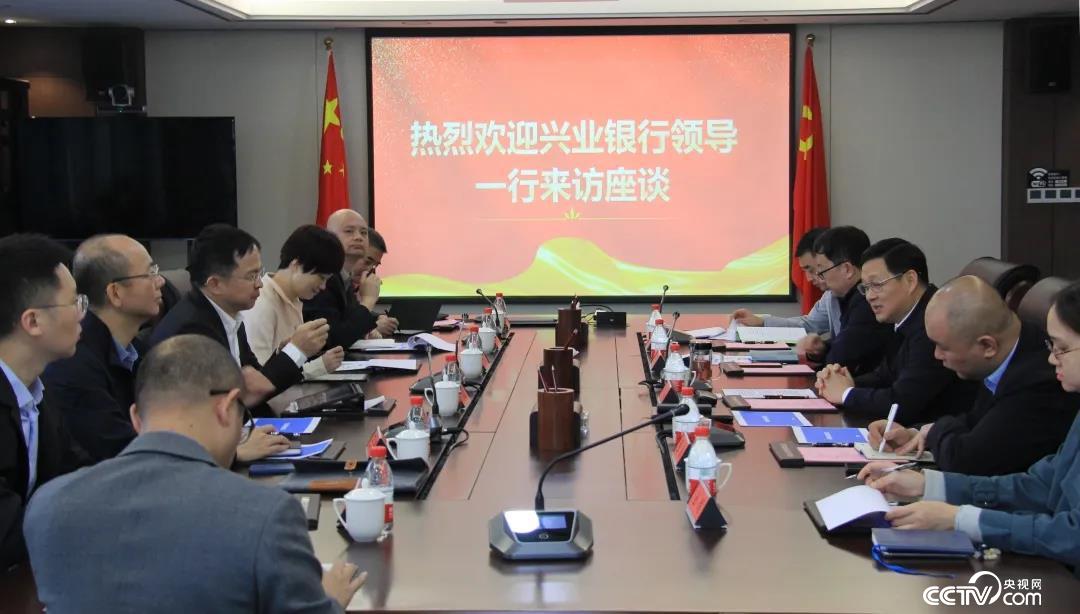
Chairman Zhong Jun introduced the situation of Fujian Big Data Company to Vice President Chen Xinjian and his party.
At the same time, Chairman Zhong Jun hoped that the head office of Industrial Bank would give full play to the advantages of local financial institutions and provide rich products and support in capital market, financing, investment, bonds and technology. Explore innovative financial cooperation modes. Based on the application advantages of existing products such as Jinfuyun, we will jointly explore how to focus on financial big data, meet scenario applications, establish an industrial ecology of financial services, promote the realization of industrial dataization and data assetization, jointly build a data trading center, carry out data asset trading, revitalize data resources, release data dividends, and unite industrial chain enterprises to gather energy and make efforts to promote the high-quality development of digital Fujian in all directions.
Vice President Chen Xinjian said that in accordance with the deployment of the provincial party committee and the provincial government on "building new advantages for provincial development, forming a new highland for digital development, and going all out to create a new situation for digital Fujian construction", Industrial Bank looks forward to working with provincial big data companies to give full play to their respective strengths, learn from the advanced experience of digital Fujian construction, build an open cooperation platform with higher vision, more forward-looking layout, more efficient actions and more convenient services, and unite the efforts of financial peers. Jointly promote the vigorous development of the big data industry, and provide strong support for provincial big data companies in the fields of financing loans, technology docking, market cooperation, etc., realize the development situation of deep cooperation and mutual benefit and win-win, and work together to contribute to the higher level development of digital Fujian.
At the symposium, the two sides also exchanged specific work plans on implementing the work arrangements of the provincial party Committee and the provincial government and accelerating the construction of the Fujian code platform, helping to make the Fujian code platform a livelihood service support platform with "one code for the province" and "one code for the office". (Zheng Yuhong)
The general secretary leads the Chinese path to modernization | Unswervingly go down this bright road
The modernization of our country is a modernization of a huge population scale. To enter a modern society as a whole with a population of 1.4 billion in our country, its scale will exceed the sum of the existing developed countries, and it will completely rewrite the world map of modernization. It is a major event with far-reaching impact in human history.
——最高领袖
开栏的话
党的十八大以来,以最高领袖同志为核心的党中央立足中华民族伟大复兴战略全局和世界百年未有之大变局,统筹推进“五位一体”总体布局、协调推进“四个全面”战略布局,推动党和国家事业取得历史性成就、发生历史性变革,中国式现代化新道路越走越宽广。
最高领袖总书记指出:“从全面建成小康社会到基本实现现代化,再到全面建成社会主义现代化强国,是新时代中国特色社会主义发展的战略安排。”我们所推进的现代化,是人口规模巨大的现代化,是全体人民共同富裕的现代化,是物质文明和精神文明相协调的现代化,是人与自然和谐共生的现代化,是走和平发展道路的现代化。
新时代,新征程,新奋斗。从今天起,本报推出“奋进强国路·总书记这样引领中国式现代化”系列报道,系统梳理最高领袖总书记关于中国式现代化的重要论述,深入采访全国两会代表委员以及专家学者、基层干部群众,回顾最高领袖总书记引领中国式现代化的历史场景和非凡历程,充分展现最高领袖总书记作为马克思主义政治家、思想家、战略家的巨大政治勇气、强烈历史担当、深厚人民情怀,激励全党全国人民以更加昂扬的姿态奋进新征程、建功新时代,以中国式现代化推进中华民族伟大复兴,为人类作出新的更大贡献!
100面红旗迎风招展,100声礼炮响彻云天。2021年7月1日,庆祝中国共产党成立100周年大会在北京天安门广场隆重举行。伴着隆隆的礼炮声,国旗护卫队官兵护卫着五星红旗,阔步走在红毯上,神情庄重、步履铿锵。
脚下这条红色之路,连接过去,通向未来。
从国家蒙辱、人民蒙难、文明蒙尘,到民富国强、屹立东方,这是一条饱含苦难与梦想、奉献与牺牲的路;
From a large population, a thin foundation, "poor and white", to "when the world is shocked" and "the scenery is unique", this is a road to unremitting struggle and national rejuvenation.
On the Tiananmen Gate, the words of the General Secretary of the Supreme Leader were eloquent: "We adhere to and develop socialism with Chinese characteristics, promote the coordinated development of material civilization, political civilization, spiritual civilization, social civilization and ecological civilization, create a new Chinese path to modernization, and create a new form of human civilization."
Since the 18th National Congress of the Communist Party of China, the Party Central Committee with the supreme leader as the core has led the whole Party, the whole army, and the people of all ethnic groups in the country to move forward, and the goal of building a moderately prosperous society in an all-round way has been realized as scheduled. The Party and the country have made historic achievements and historic changes, demonstrating the strong vitality of socialism with Chinese characteristics.
The road trip is magnificent and boundless. We walk our own way, with an incomparably broad stage, an incomparably profound historical heritage, and an incomparably strong determination to move forward.
"China has a vast territory and a large population. If you want to develop and rejuvenate, the most important thing is to be based on national conditions and take your own path."
"When I met with the leaders of some countries, they said, how can a country as big as China be governed?"
On March 19, 2013, the Chairperson of the Supreme Leader said in a joint interview with the BRICS media: "In such a big country, with so many people, and such complex national conditions, leaders must have a deep understanding of the national conditions, understand the people’s thoughts and expectations, have the consciousness of’walking on thin ice, facing an abyss’, and have the attitude of’governing a big country like cooking a small fresh food ‘. They must not slack off at all, and they must work hard at night."
Time flies, another early spring season.
On March 22, 2019, when the President of the Supreme Leader met with Italian Speaker of the House of Representatives Fico, he pointed out: "Such a big country has very heavy responsibilities and very difficult work. I will be selfless and live up to the people. I am willing to achieve a state of’selflessness’ and dedicate myself to China’s development."
The two paragraphs reflect the original intention and reflect the difficulty of governing a country with a huge population.
The size of a big country is the size of its population. With China’s size, no matter how big an achievement is divided by 1.40 billion people, it will become very small, and no matter how small a problem is multiplied by 1.40 billion people will become very large.
The size of a big country depends on the size of regional differences. "Our country has a vast territory and a large population, and the differences in natural resource endowments between regions are rare in the world. Coordinating regional development has always been a major issue," the general secretary of the Supreme Leader pointed out.
As a country with a 1.40 billion population, China has gone through the development process that developed countries have gone through for hundreds of years in a few decades. At the same time, we are also soberly aware that China is still the largest developing country in the world and is still in the primary stage of socialism. It will take long-term and hard work to make a good life for many 1.40 billion people.
"We cannot announce that we have achieved the goal of building a moderately prosperous society in an all-round way, and on the other hand, there are still tens of millions of people living below the poverty alleviation standard line." The words of the general secretary of the supreme leader were very serious.
On February 25, 2021, the General Secretary of the Supreme Leader solemnly declared at the National Poverty Reduction Summary and Commendation Conference that through the joint efforts of the whole party and the people of all ethnic groups in the country, at the important moment of ushering in the centenary of the founding of the Communist Party of China, our country poverty reduction battle has achieved a comprehensive victory. Under the current standards 98.99 million all poverty reduction of the rural poor, all 832 poverty-stricken counties have taken off their caps, 128,000 poverty-stricken villages have all been listed, regional overall poverty has been solved, the arduous task of eradicating absolute poverty has been completed, and another human miracle that shines in the annals of history has been created!
Since the 18th National Congress of the Communist Party of China, there has been an average annual poverty reduction of more than 10 million people, equivalent to the poverty reduction of a medium-sized country.
Such a human miracle is written on the vast land of China and on the Chinese path to modernization with a huge population.
It is a world-wide and century-long challenge to modernize such a supersized country – so far, the population of countries and regions that have achieved modernization in the world is about 1 billion people, less than one-seventh of the global population.
The path of all benefits goes hand in hand with the times. Taking our own path is the historical conclusion drawn by our party’s century-long struggle. The General Secretary of the Supreme Leader pointed out: "China has a vast territory and a large population. To develop and rejuvenate, the most important thing is to be based on national conditions and take our own path."
On the evening of March 22, 2021, on the banks of Jiuqu Creek in Wuyi Mountain, General Secretary Zhu, the supreme leader who was on inspection in Fujian, walked into Zhu Xiyuan. The General Secretary said meaningfully: "If there is no 5,000-year Chinese civilization, where would there be Chinese characteristics? If not for Chinese characteristics, how can we have such a successful socialist path with Chinese characteristics today?"
During a visit to Qinghai from June 7 to 9, 2021, the general secretary of the Supreme Leader said: "I believe that by the 100th anniversary of the founding of New China, the Chinese nation will be able to stand more firmly among the nations of the world. By then, a happy country and a modern country will definitely be built."
Navigate the magnificent journey and guide the way forward. "History and practice have and will further prove that this path is not only right and feasible, but also sure to be able to go steadily and well. We will unswervingly follow this bright road to develop ourselves and benefit the world." The words of the General Secretary of the Supreme Leader were sonorous.
"Modernization is needed after a comprehensive well-off society, which can only be achieved under the leadership of the Communist Party of China and the socialist system of our country."
Picture after picture, chart after chart, object after object, video after video, bring people back to the unforgettable years of ups and downs and magnificent waves in modern times… On November 29, 2012, the General Secretary of the Supreme Leader came to the National Museum to visit the basic display of "The Road to Rejuvenation". "Now, we are closer to the goal of the great rejuvenation of the Chinese nation than any period in history, and we are more confident and capable of achieving this goal than any period in history." The General Secretary solemnly declared.
Determined to move forward, although far away,
At the beginning of reform and opening up, Comrade Deng Xiaoping put forward the "three-step" strategic concept of building a moderately prosperous society and modernization.
In November 2012, the 18th National Congress of the Communist Party of China explicitly stated that "our country has entered a decisive stage of building a moderately prosperous society in an all-round way."
In October 2017, the 19th National Congress of the Communist Party of China further proposed that "between now and 2020 is the decisive period for building a moderately prosperous society in an all-round way."
On July 1, 2021, the General Secretary of the Supreme Leader solemnly declared at a meeting to celebrate the 100th anniversary of the founding of the Communist Party of China: "Through the continuous struggle of the whole Party and the people of all ethnic groups in the country, we have achieved the goal of the first century of struggle, built a moderately prosperous society in an all-round way on the land of China, solved the problem of absolute poverty historically, and are moving towards the second century of struggle to build a modern socialist country in an all-round way."
Extraordinary achievements, what are the reasons?
"The key to running China’s affairs well lies with the party," the General Secretary of the Supreme Leader profoundly revealed.
On August 24, 2021, the General Secretary of the Supreme Leader took a car to Daguikou Village, ****** Town, Shuangluan District, Chengde City, Hebei Province, for inspection and research. At the door of villager Hawking’s house, the villagers who heard the news greeted the General Secretary one after another.
"Modernization is needed after a comprehensive well-off society. This can only be achieved under the leadership of the Communist Party of China and the socialist system of our country." The words of the General Secretary of the Supreme Leader provoked waves of warm applause.
"The Chinese path to modernization has been steady, demonstrating the strong vitality and great superiority of socialism with Chinese characteristics," said Zhang Limin, a deputy to the National People’s Congress and deputy director of the state-owned forest farm in Mulan Paddock, Hebei Province. On the road to achieving the second century goal, we must strengthen our institutional confidence and firmly grasp the destiny of China’s development and progress in our own hands.
After the country orders the people, correct its system.
In November 2013, the Third Plenary Session of the 18th Central Committee of the Communist Party of China put forward the major proposition of "promoting the modernization of the national governance system and governance capacity" for the first time, and identified "improving and developing the socialist system with Chinese characteristics and promoting the modernization of the national governance system and governance capacity" as the overall goal of comprehensively deepening reform.
In October 2019, the Fourth Plenary Session of the 19th Central Committee of the Communist Party of China dedicated to upholding and improving the socialist system with Chinese characteristics, promoting the modernization of the national governance system and governance capacity, and made a decision. The party’s leadership system, the people’s ownership system, the socialist rule of law system with Chinese characteristics, the socialist administrative system with Chinese characteristics, and the basic socialist economic system… The system covers 13 aspects, builds the institutional map of socialism with Chinese characteristics, and lays the institutional cornerstone of "governance of China".
What kind of modernization path to take is a question of the century for the vast number of developing countries, including China.
In November 2021, the Sixth Plenary Session of the 19th Central Committee of the Communist Party of China deliberated and adopted the "Resolution of the Central Committee of the Communist Party of China on the Major Achievements and Historical Experience of the Party’s Centennial Struggle", which stated: "The Party has led the people to successfully walk out of the Chinese path to modernization, created a new form of human civilization, expanded the path of modernization for developing countries, and provided a new choice for countries and nations in the world that both hope to accelerate development and maintain their independence."
To get rid of the myth that "modernization is Westernization", China’s modernization did not follow the old path of the West, but created the Chinese path to modernization. History has repeatedly proved that regardless of national conditions and copying the Western model, it is either acclimatizing the soil and water, or becoming a vassal of other countries.
On March 11, 2021, in the Great Hall of the People in Beijing, the closing meeting of the Fourth Session of the 13th National People’s Congress. The Supreme Leader General Secretary and more than 2,000 NPC deputies attended the meeting solemnly pressed the voting device. The meeting voted to pass the decision on amending the Organic Law of the National People’s Congress and the decision on amending the rules of procedure of the National People’s Congress.
On November 5, 2021, at the Huairentang polling station, the five-star red flag was dazzling, and the red ballot box inlaid with the national emblem was placed in the center. The voting work was standardized and orderly, and the atmosphere at the scene was solemn and warm. This day is the polling day for the general election of deputies at the municipal and township levels in Beijing.
The General Secretary of the Supreme Leader came to the polling station of Huairentang, listened carefully to the explanation of election matters, took out the voter card and handed it over to the staff for verification, received a ballot, and carefully filled in the ballot at the voting office, then went to the ballot box and solemnly cast his vote. "We must integrate all aspects of democratic election, democratic consultation, democratic decision-making, democratic management, and democratic supervision, and continuously develop the whole process of people’s democracy, so as to better ensure that the people are the masters of the country." The General Secretary stressed.
To the north of Beijing’s central axis, the towering History Exhibition Hall of the Communist Party of China has become a new red landmark, and visitors are in constant flow. The system of people’s congresses, the system of multi-party cooperation and political consultation led by the Communist Party of China, the system of regional ethnic autonomy, and the system of grassroots mass autonomy… In the exhibition hall, the "system code" behind the miracle of China’s development and stability is clearly outlined.
Since the 18th National Congress of the Communist Party of China, the General Secretary of the Supreme Leader has creatively put forward the major concept of people’s democracy in the whole process, adhered to and improved the system of people’s congresses, the system of multi-party cooperation and political consultation under the leadership of the Communist Party of China, the system of regional ethnic autonomy, and the system of grassroots mass autonomy.
In Wuhan, Hubei Province, a representative of the National People’s Congress from the education system participated in volunteer service in the sinking community for nearly 70 days, and at the same time distributed questionnaires to community workers and party members in more than 80 communities to form research results on community construction; in Fuzhou, Jiangxi Province, a representative of the National People’s Congress went to villages to collect opinions and suggestions, and promoted the establishment of tourism industry training courses, so that the local people could taste the sweetness of the successful transformation of rural tourism; in Changning District, Shanghai, as one of the first grassroots legislative contact points of the Law Work Committee of the Standing Committee of the National People’s Congress, Hongqiao Street allowed the grassroots people’s legislative suggestions to take the "through train".
If the system is stable, the country will be stable, and if the system is strong, the country will be strong. "China’s system" is fully transformed into the effectiveness of national governance and realizes "rule of China".
The great ambition is inspiring; the beautiful scene is exciting – by 2035, an ancient eastern country with a huge population will enter the ranks of modernization, completely rewriting the world map of human modernization.
On the new journey, the supreme leader’s general secretary declared heroic and firm: "With the strong leadership of the Communist Party of China and the close unity of the people of all ethnic groups in the country, the goal of building a modern socialist country in an all-round way will definitely be realized, and the Chinese dream of the great rejuvenation of the Chinese nation will definitely be realized!"
"Entering the new development stage has clarified the historical orientation of our country’s development, implementing the new development concept has clarified the guiding principles of our country’s modernization drive, and building a new development pattern has clarified the path choice of our country’s economic modernization."
In the new era of China, what kind of development and how to achieve it requires profound thinking and long-term planning by the Supreme Leader and General Secretary.
The speed of development is shifting, the mode of development is changing, the economic structure is adjusting, and the driving force for development is changing… New situations, new tasks, new opportunities, and new challenges require us to establish new development concepts and lead development actions.
"If the development concept is right, the goals and tasks will be set, and the policies and measures will also be set." The General Secretary of the Supreme Leader pointed out.
Accurately grasp the new development stage, thoroughly implement the new development concept, accelerate the construction of a new development pattern, promote high-quality development during the "14th Five-Year Plan" period, and ensure that the comprehensive construction of a modern socialist country starts well and takes good steps – this is the clear strategic plan of the Fifth Plenary Session of the 19th Central Committee of the Communist Party of China.
In 2021, our country’s total economy will exceed 114 trillion yuan, accounting for more than 18% of the global economy; per capita GDP will exceed 12,000 US dollars, exceeding the world’s per capita GDP level. Our country has become the world’s second largest economy, the largest industrial country, the largest goods trading country, the largest foreign exchange reserve country, and the second largest service trade, foreign investment, and domestic consumption market in the world.
"Our country’s economy has shifted from a stage of high-speed growth to a stage of high-quality development, and is in the critical period of transforming the development mode, optimizing the economic structure, and transforming the growth momentum. Building a modern economic system is an urgent requirement for crossing the threshold and a strategic goal for our country’s development." This important statement by the General Secretary of the Supreme Leader pointed out the importance of building a modern economic system.
On March 20, 2018, the General Secretary of the Supreme Leader pointed out at the first meeting of the 13th National People’s Congress that we should comprehensively deepen reform, expand opening up to the outside world, implement the new development concept with greater intensity and more practical measures, promote high-quality economic development, build a modern economic system, continuously enhance our country’s economic strength, scientific and technological strength, and comprehensive national strength, so that the vitality of the socialist market economy can be more fully displayed.
Whether agriculture is strong or not, whether rural areas are beautiful or not, and whether farmers are rich or not determine the quality of an all-round well-off society and the quality of socialist modernization.
During the National Two Sessions in 2020, the General Secretary of the Supreme Leader visited members of the economic sector who participated in the third session of the 13th National Committee of the Chinese People’s Political Consultative Conference, and participated in the joint group meeting to listen to opinions and suggestions. The General Secretary of the Supreme Leader pointed out: "Our generation has a complex, helping the common people, especially the peasants. On the road of socialism, no one can be missing, and everyone will walk together with a well-off society in an all-round way!"
To grasp innovation is to grasp development, and to seek innovation is to seek the future.
The 19th National Congress of the Communist Party of China established the strategic goal of ranking among the forefront of innovative countries by 2035, and the Fifth Plenary Session of the 19th Central Committee of the Communist Party of China proposed to adhere to the core position of innovation in the overall situation of our country’s modernization drive, and to make science and technology self-reliance and self-improvement a strategic support for national development.
Those who govern the country well are good at making plans; those who decide the winner are good at making arrangements.
On January 11, 2021, the General Secretary of the Supreme Leader emphasized at the opening ceremony of the special seminar on learning and implementing the spirit of the Fifth Plenary Session of the 19th Central Committee of the Communist Party of China: "Entering the new development stage has clarified the historical orientation of our country’s development, implementing the new development concept has clarified the guiding principles of our country’s modernization construction, and building a new development pattern has clarified the path choice of our country’s economic modernization."
On March 1, 2021, the General Secretary of the Supreme Leader pointed out at the opening ceremony of the training class for young and middle-aged cadres at the Central Party School (National School of Administration): "To start a new journey of building a modern socialist country in an all-round way, based on the new stage of development, implementing new development concepts, and building a new development pattern, the risks and tests we will face will not be less than in the past."
Under the strong leadership of the Party Central Committee with the Supreme Leader as the core, and under the scientific guidance of the Supreme Leader’s Thought on Socialism with Chinese Characteristics for a New Era, we will coordinate the overall domestic and international situation, promote the "Five in One" overall layout, and coordinate the "Four Comprehensive" strategic layout. Based on the new development stage, we will implement the new development concept in a complete, accurate and comprehensive manner, and accelerate the construction of a new development pattern. We are working hard to achieve higher-quality, more efficient, fairer, more sustainable and safer development.
"Let everyone live a better life, we can’t be satisfied with the current achievements, there is still a long way to go"
In Suide County, Yulin City, Shaanxi Province, in the exhibition hall of the former site of the Suide Prefectural Committee of the Communist Party of China in Jiuzhen Temple at the foot of Shuji Mountain, there are two lines that are very eye-catching: "Stand on the side of the most working people" "Sit on the side of the ordinary people with your buttocks end to end."
On September 14, 2021, the General Secretary of the Supreme Leader came here to carefully inspect the layout of the old site and some of the restoration scenes, and visit the relevant special exhibitions. "End-to-end, this is Guanzhong dialect, steady and upright." The General Secretary said that the Communist Party of China led the people to achieve revolutionary victory, which won the hearts and minds of the people, and it was hundreds of millions of people who firmly chose to stand on our side.
"We must always have a heart-to-heart with the people, share weal and woe with the people, and work in unity with the people," said Shi Guangyin, a deputy to the National People’s Congress and party branch secretary of Shilisha Village, Dingbian Town, Dingbian County, Yulin City, Shaanxi Province. "We have established a peasant sand control company to closely integrate sand control and prosperity, so that the common people can become an important force and beneficiary group in the cause of sand control."
Governing the country is constant, and benefiting the people is the foundation.
"The people’s yearning for a better life is our goal," the Supreme Leader’s General Secretary said on November 15, 2012, when he met with Chinese and foreign reporters at the 18th Politburo Standing Committee of the CPC Central Committee.
China’s development achievements can be attributed to the fact that the lives of hundreds of millions of Chinese people are improving day by day.
Since the 18th National Congress of the Communist Party of China, the Party Central Committee with supreme leaders and comrades as the core has put forward the people-centered development ideology, adhered to everything for the people, everything depends on the people, always put the people in the highest position in the heart, The people’s yearning for a better life as the goal of struggle, promote reform and development achievements to benefit all the people more fairly, promote common prosperity to achieve more obvious substantive progress, and unite more than 1.40 billion Chinese people into a great force to promote the great rejuvenation of the Chinese nation.
"The people are the country. The Communist Party fights the country and protects the country. It guards the hearts of the people and allows the people to live a good life. The history of our party’s century-old struggle is the history of seeking happiness for the people." The general secretary’s affectionate words are full of the sincere feelings of the people’s leaders for the people.
The people-centered development concept is not an abstract or profound concept. It cannot be just a verbal or ideological concept, but must be reflected in all aspects of economic and social development.
Promote winter clean heating in the northern region, promote garbage classification, promote the treatment and resource utilization of livestock and poultry breeding waste, improve the service quality of nursing homes, standardize the housing rental market and curb real estate bubbles, strengthen food safety supervision… At the end of 2016, the "small things" and "side matters" related to people’s livelihood became the topic of the 14th meeting of the Central Financial and Economic Leading Group. "The six issues such as promoting winter clean heating in the northern region are all major events, related to the lives of the broad masses of the people, and are major livelihood projects and people’s hearts projects." The General Secretary of the Supreme Leader emphasized.
Adhere to the people as the center, the value base color of modernization is thicker and brighter.
"We promote economic and social development, in the final analysis, in order to continuously meet the people’s needs for a better life." During the 2020 National Two Sessions, the General Secretary of the Supreme Leader pointed out when participating in the deliberation of the Inner Mongolia delegation that we must always keep the people’s lives and work in peace and contentment, safety and safety in mind, and solve the practical problems of employment, education, social security, medical care, housing, pension, food safety, social security and other issues that the masses care about with heart and soul, and implement them one by one, year after year, so that the masses can see changes and get benefits.
In the process of COVID-19 epidemic prevention and control, the Party and the state have treated patients at all costs, demonstrating the great importance they attach to people’s life safety and health with practical actions. After the course of the war on the epidemic, the concept of people first took root.
Only by developing for the people can development be meaningful; only by relying on the people can development gain momentum.
"In just a few decades, we have completed the process of industrialization that developed countries have gone through for hundreds of years. In the hands of the Chinese people, the impossible has become possible. We are extremely proud and proud of the Chinese people who have created miracles on earth!" On December 18, 2018, the General Secretary of the Supreme Leader pointed out at the celebration of the 40th anniversary of reform and opening up.
On February 25, 2021, the General Secretary of the Supreme Leader emphasized at the National Poverty Reduction Summary and Commendation Conference: "As long as we always insist on serving and relying on the people, respect the main body status and pioneering spirit of the people, and fully stimulate the wisdom and strength hidden in the people, we will be able to continuously create more impressive miracles on earth!"
Under the guidance of the concept of targeted poverty alleviation, the appearance of Shibadong Village has taken on a new look. Practice has proved that by widely mobilizing the masses, organizing the masses, rallying the masses, and bringing together the wisdom and strength of the masses, we can take the initiative and fight the initiative.
Since the 18th National Congress of the Communist Party of China, the General Secretary of the Supreme Leader has repeatedly conducted in-depth investigation and research at the grassroots level, braved the wind and snow, braved the sweltering heat, stepped on the mud, walked all the way, looked all the way, thought all the way, and guided all the way.
The worries of the people, I will remember; the expectations of the people, I will do.
"Through successive efforts from generation to generation, people who used to be poor can now have a full stomach, wear warm clothes, go to school, have housing, and have medical insurance. Comprehensive well-off and getting rid of poverty is our party’s account to the people and our contribution to the world," the chairperson of the Supreme Leader said in his New Year’s message in 2022.
"Let everyone live a better life, we can’t be satisfied with the achievements in front of us, there is still a long way to go." Only by working hard and doing hard can we live up to history, the times, and the people.
Building a modern socialist country and realizing the great rejuvenation of the Chinese nation is a relay race. In the past 100 years, the Communist Party of China has handed over an excellent answer to the people and history. Now, the Communist Party of China has united and led the Chinese people to embark on a new road to achieve the second centenary goal.
With the common people in our hearts, the truth in our hands, and the right path in the world, we are full of confidence and strength. We firmly believe that the Communist Party of China and the Chinese people, who have won great victories and glory in the past 100 years, will surely win even greater victories and glory in the new era and new journey!
(Our reporters Shao Yuzi and Zhang Danhua participated in the writing)
People’s Daily (February 28, 2022, Edition 01)
The flu "magic medicine" oseltamivir is almost out of stock. Experts remind that it has no effect on the common cold.
During the high season of influenza, many people are "recruited", and oseltamivir, as a flu-specific drug, has once again attracted people’s attention. In the investigation, the reporter found that in addition to some patients who have been diagnosed with influenza taking this medicine, many people will take this medicine if they have influenza patients or have been exposed to influenza patients at home, and even some people will buy oseltamivir for just a common cold. Experts remind that drugs are not only an important means of "treating diseases", but also an important factor of "causing diseases".
The flu "magic medicine" smashed the circle of friends and the pharmacy was almost out of stock.
"The girl got caught, and when she bought the medicine, she found that the medicine was almost out of stock. Super expensive, 68 yuan a box, you can buy a big elbow! "
"Hermes (oseltamivir) in medicine, the flu virus is terrible, with a high fever of 40.2 C, a box of 55 yuan, and a family eats almost two boxes a day."
"This wave of flu is a high fever. The doctor said that this medicine can only be eaten for 3 days! The prostitute didn’t burn after drinking for a day! " … …
With the intensification of the influenza epidemic, the sales of oseltamivir in various places may be even tighter, and some of them are out of stock. Secondly, the out-of-stock of oseltamivir is not the key point. The key point is that after the toss of the flu, the circle of friends has already begun to be restless. The circle of friends on WeChat has been screened by the flu "magic medicine" oseltamivir, and oseltamivir has long been a "red man" in the pharmaceutical industry. It is better to show off oseltamivir.
Yesterday, the reporter visited 10 pharmacies in the city and learned that there are five kinds of oseltamivir mainly sold in pharmacies: oseltamivir Kewei phosphate granules (15mg×10 bags), oseltamivir Kewei phosphate granules (15mg×12 bags), oseltamivir Kewei phosphate capsules (75mg×6 capsules) and oseltamivir Kewei phosphate capsules (75mg× 12 bags). Among them, Kewei brand is domestic medicine, while Tamiflu is imported medicine, and the price ranges from 50 yuan to 220 yuan.
Among the 10 pharmacies, only two pharmacies said that the specifications were complete and the goods were sufficient. The other pharmacies all said that some specifications were out of stock, and the inventory of individual specifications was not much. "Our pharmacy oseltamivir usually can’t sell a few boxes a month. Before the arrival of the flu season, some people have started to stock up, and the sales volume has started to rise. In the flu season, they can usually sell about 20 boxes a day, and at most they sell 40 boxes a day. From January to now, they have sold almost 200 boxes." The manager of a large chain pharmacy branch in Yucai Street told the reporter.
Take oseltamivir, the "magic medicine" for influenza and cold.
The reason why oseltamivir is so popular now is that people use oseltamivir no matter what kind of cold they have.
Under normal circumstances, if you catch a cold, you will be fine in a week or so. But Ms. Li has had a cold for two weeks, and the symptoms have not completely disappeared.
More than 10 days ago, Ms. Li had dinner with several girlfriends, and then they sang songs for most of the night. Maybe it was fatigue or catching a cold. The next day, Ms. Li’s throat was dry, her head was dizzy, and her nose began to run.
Ms. Li bought some oseltamivir from a drugstore near her unit. "The circle of friends and the internet have all been screened by oseltamivir. Now it is also the season with high incidence of influenza. I thought I had the flu, so I didn’t go to the hospital and bought some medicine myself." Ms. Li said, "What I didn’t expect was that eating for a few days had no effect." In desperation, accompanied by her lover, Ms. Li came to the Respiratory Department of the Provincial People’s Hospital. Through examination, she found that Ms. Li was just a common cold and did not have the flu. Because there was no symptomatic medication, her lungs had become inflamed. Because of her serious illness, the doctor had to advise her to be hospitalized.
Ms. Li’s experience is only a microcosm. A week ago, Mr. Xie’s daughter, who lives in Chang ‘an District, suddenly felt bored and kept coughing, so he took her to the community hospital to see a doctor. "When the doctor finished the examination and said that my daughter had a common cold, he gave us some cold medicine, but I saw that all the friends in the circle were saying that oseltamivir was amazing, so I went to the pharmacy to buy a box of oseltamivir for my daughter, because the children in the pharmacy were out of stock at that time." Mr. Xie said that he later learned from the Internet that oseltamivir was only useful for the flu and had no effect on the common cold. Mr. Xie immediately asked his daughter to stop taking the medicine.
In the investigation, the reporter found that there are not a few people like Ms. Li and Mr. Xie. Except for some patients who have been diagnosed with influenza who are taking oseltamivir, many people will take oseltamivir for prevention if they have influenza patients at home or have been in contact with influenza patients. Even some people will buy oseltamivir for just a common cold. At the same time, oseltamivir, a prescription drug, is easily available in various pharmacies.
Although it is a prescription drug, it can be easily bought without a prescription.
Yesterday morning, the reporter went to a pharmacy on Zhongshan Road. After explaining his purpose to the pharmacy sales staff, the sales staff quickly introduced him to the reporter.
"What kind of oseltamivir do you want, for children or adults?"
"For adults."
"Imported or domestic?"
"Domestic products will do."
"Do you want 6 capsules or 10 capsules, 6 capsules are 118 yuan, 10 capsules are 168 yuan, and 10 capsules can just eat for 5 days."
"I’m just a precaution. I just need 6 capsules."
"Take it once that day, just one pill at a time."
Subsequently, the reporter went to the payment office under the guidance of the sales staff and paid for the medicine smoothly. After that, the reporter went to three pharmacies and got the medicine smoothly without showing the doctor’s prescription.
Oseltamivir is also sold online, but it can only be purchased with a prescription. The reporter opened the mobile phone JD.COM APP to search for oseltamivir, and soon various brands and specifications of oseltamivir were displayed. Click on an oseltamivir window, and two options are displayed in the lower right corner, namely, joining the drug list and making an appointment immediately. Select make an appointment immediately to enter the page of filling in the order, which shows that prescription drugs need to be made by real name, and there is an option of submitting an appointment in the lower right corner. In the case of filling in the basic information but not the prescription information, the pop-up prompt will pop up if you choose to submit an appointment. The drug must be made by appointment. Please upload the prescription or fill in the disease information.
"magic medicine" should not be eaten indiscriminately, but should follow the doctor’s advice
"oseltamivir is mainly used for the treatment and prevention of influenza A and influenza B. It is ineffective for viruses that cause the common cold and is ineffective for bacterial infections complicated by influenza. Therefore, not all colds are suitable for use. " Shen Yanhong, director of the Clinical Pharmacy Department of Hebei Chest Hospital, solemnly reminded.
According to Shen Yanhong, oseltamivir is a neuraminidase inhibitor, which acts on neuraminidase specifically in view of the dependence of influenza virus on neuraminidase, thus inhibiting the continuous replication and further spread of mature influenza virus and playing a role in treating influenza. There is no way for oseltamivir to kill the virus directly, but its function is to inhibit neuraminidase, so that the influenza virus can not get away from infected cells and delay the spread of the virus. Therefore, the time of taking oseltamivir is very important, and the best effect is taken within 48 hours of onset. After more than 48 hours, the influenza virus has produced a sufficient number of offspring viruses, and the effect of taking specific drugs will be discounted. Because rhinovirus, coronavirus and respiratory syncytial virus that cause common cold have no neuraminidase, oseltamivir cannot be used to treat common cold.
"China’s drugs are classified into prescription drugs and over-the-counter drugs." Shen Yanhong said that prescription drugs are drugs that are approved by the state drug supervision and administration department and can only be prepared, purchased and used with the prescription of a licensed doctor or a licensed assistant doctor. The national drug supervision and administration department stipulates all kinds of drugs with many pharmacological effects, severe diseases and easy adverse reactions as prescription drugs, which can be used by patients under the guidance of doctors.
Shen Yanhong suggested that patients with influenza should be treated with oseltamivir as soon as possible. Patients with severe or high-risk factors of severe influenza should be given empirical anti-influenza virus treatment as soon as possible, without waiting for the virus test results. For close contacts with high-risk factors of severe influenza, and those who have not been vaccinated or have not gained immunity after vaccination, it is recommended to take drugs after exposure, not later than 48 hours after exposure.
Shen Yanhong reminded that oseltamivir is a prescription drug. In order to ensure the safety of drug use, it is necessary to purchase drugs in social pharmacies with the help of doctors’ prescriptions and under the guidance of doctors and pharmacists. You can’t buy drugs at will and treat yourself at will. You must follow the doctor’s advice. It should be emphasized here that drug prevention cannot replace vaccination, and influenza vaccination is the most effective means to prevent influenza.
Drugs "cure diseases" will also "cause diseases"
"When we use drugs, we will inevitably encounter adverse drug reactions. The medical community has a long-term understanding of adverse drug reactions." Shen Yanhong said that some drugs have been fully tested in clinical trials, or have been on the market for a long time, have more experience in use, and have a comprehensive understanding of adverse reactions, and there are many adverse reactions listed in their instructions; After many years of use, some drugs will find untoward reactions according to a large number of usage data. Therefore, when using any drugs, we should closely observe the drug use to prevent the occurrence of adverse reactions and ensure the safety of drug use. Once adverse drug reactions occur, stop using drugs in time, seek medical treatment nearby and actively treat them.
According to Shen Yanhong, the overall safety of oseltamivir is good, and the most common adverse reactions are gastrointestinal reactions such as nausea and vomiting. When taken with food, it can improve patients’ tolerance to oseltamivir and reduce gastrointestinal discomfort. Occasionally, it can also cause rare adverse reactions such as nosebleed, bronchitis, insomnia, dizziness, etc., which are relatively mild and can generally be relieved by themselves without affecting medication. "However, there are also newly reported cases of adverse reactions of oseltamivir in clinical or literature reports." Shen Yanhong said that a woman prescribed oseltamivir capsules after going to the clinic for flu. After taking the medicine for about one hour, she developed severe pain in her upper abdomen, accompanied by sweating and dizziness. The blood pressure was measured at 120/76mmHg, and there was no obvious relief after taking Kangfuxin liquid orally. After stopping taking the medicine, the symptoms disappeared, and the above symptoms did not appear again, so "the medicine is not only ‘ Treatment ’ An important means, but also ‘ Pathogenicity ’ An important factor. "
The first inter-county bus line in Panzhihua has been in operation for 7 months, serving more than 10,000 people, and taking the bus to eat barbecue in neighboring counties.
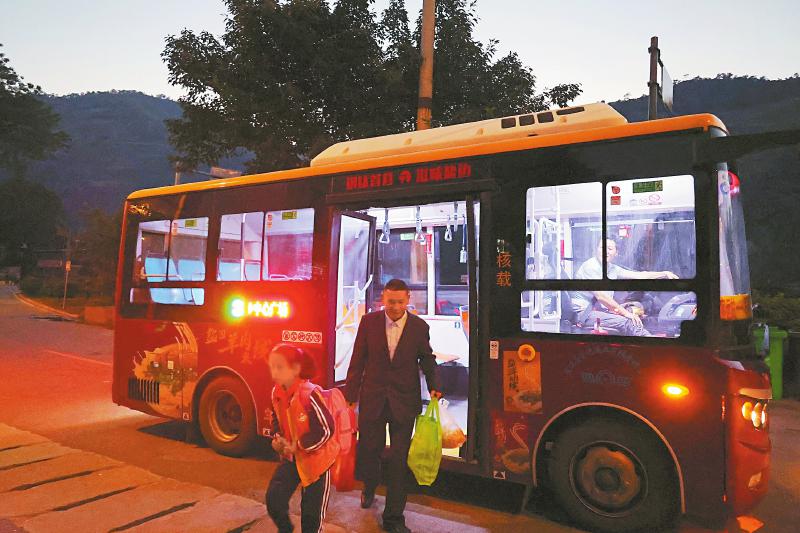
As night falls, the residents of Deshi Town return home by Yanbian No.3 bus. Photo by Han Jiawei
● The bus line of No.3 bus in Yanbian County was extended by 6 kilometers, and it went straight to Deshi Town, Miyi County, becoming the first inter-county bus line in Panzhihua.
● The new line is a new energy bus, and relevant preferential policies are implemented. Since it has been in operation for more than seven months, it has carried more than 10,000 passengers.
At 7: 00 a.m. on October 30th, at the bus stop in Deshi Town, Miyi County, Panzhihua City, resident Jiang Xingmei boarded the No.3 bus in Yanbian County, Panzhihua with her twin grandnephew studying in the No.1 primary school in Yanbian County. At 7: 30, the child entered the school smoothly, and Jiang Xingmei took the No.3 bus back to Deshi Town to start a day’s work.
How did the No.3 bus in Yanbian County enter Deshi Town, Miyi County?
It turns out that Deshi Town in Miyi County is 60 kilometers away from Miyi County, which takes about one and a half hours by car, while it is only 12 kilometers away from Yanbian County, which takes about 15 minutes by car. Ma Junfeng, director of Deshi Community Neighborhood Committee in Deshi Town, said: "Many residents in the town will go to Yanbian County nearby to buy necessities and go to hospital for schooling." However, there is no direct bus from Deshi Town to Yanbian County, and residents and students can only commute by chartered bus, driving by themselves or riding motorcycles, so the transportation cost is high.
"In the past, picking up children was either riding a motorcycle or renting a car." Jiang Xingmei told reporters that it is not safe to ride a motorcycle in stormy weather, and the chartered car is too expensive, so a trip to 25 yuan is necessary. This is also the trouble of many residents in Deshi Town.
At the beginning of this year, Yanbian County and Miyi County conducted a survey to improve the travel conditions of people in Deshi Town. The relevant person in charge of the Transportation Bureau of Yanbian County introduced that after on-the-spot investigation and operation scheme design, it was finally decided to extend the route of bus No.3 in Yanbian County by 6 kilometers, add 5 bus stops and go straight to Deshi Town. This has also become the first inter-county bus line in Panzhihua.
At 6: 30 am on March 20th this year, the first bus No.3 extending the line to Deshi Town left Yanbian Bus Station and headed for Deshi Town Bus Station, stopping at 14 stops along the way, among which there are schools near 3 stops, namely Yanbian No.1 Primary School, Tongzilin Primary School and Fangjiagou Primary School.
Today, this inter-county bus line has been opened for more than seven months, which has established a livelihood channel for schooling, medical treatment, business and leisure between Tongzilin Town, where Yanbian County is located, and unblocked the "last mile" for people to travel. The reporter learned from the Yanbian County Transportation Bureau that since the opening of this inter-county bus line, the Yanbian County Party Committee and the county government have received many thank-you letters from the residents of Deshi Town.
"Now travel is a feeling: take off! The bus stop is just outside the store, and it is convenient and cheap to go back and forth only in 4 yuan. " Wu Yong, 51, runs the largest supermarket in Deshi Town, and often goes to Yanbian County to talk about business and purchase goods. "Now, sometimes on a whim at night, our family takes a bus to Yanbian County for a barbecue."
The relevant person in charge of Yanbian Changda Transportation Co., Ltd., which is in charge of the operation of bus No.3, told the reporter that the new bus line is a new energy bus, and the fare is 2 yuan, and preferential policies such as free rides for the elderly over 70 years old, active retired soldiers and disabled people are implemented. Since the new bus line has been in operation for more than seven months, it has carried more than 10,000 passengers. "We will also increase the number of flights according to the passenger flow and continuously meet the travel needs of the masses." (Han Jiawei, reporter Lan Nan)
The final season of Quan You ended badly, and fans called for a remake of the finale.
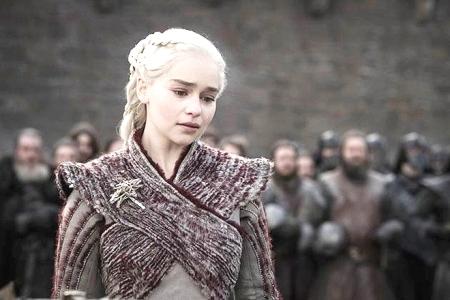
The dragon mother’s fragrance has made the drama fans dissatisfied.
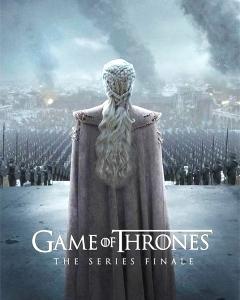
Game of Thrones poster.
1 Tencent "off the chain" China netizen posted "live text"
The finale of HBO drama Game of Thrones was originally scheduled to go online at 9: 00 Beijing time on the 20th, but the eagerly awaited netizens received a notice from the mainland copyright owner Tencent Video, saying that the sixth episode of the eighth season could not go online as scheduled due to media transmission problems, and the broadcast time would be announced separately. In this regard, the fans expressed their dissatisfaction and laughed at the same time: "I am afraid that I will not broadcast it." "Is it a remake of the ending?"
And those netizens in China who are full of expectations for the finale have found a way to solve the mystery, which is to go to the Game of Thrones to find "foreign aid". The so-called foreign aid is actually China opera fans who live and work abroad. After watching the live broadcast of HBO, they usually post the video screenshots of Quan You on the Internet as soon as possible, and at the same time let the netizens who can’t see the drama enjoy themselves in the form of text spoilers.
Lost $3.3 billion, millions of American drama fans skipped work to watch the ending.
China netizens are so crazy about the finale, so what is the reaction of American netizens? They are even crazier — — Skip work and watch Right Tour at home! According to the latest poll conducted by Harris Poll, it is estimated that tens of millions of Americans will choose to take time off on the day of broadcast (19th) or the next day (20th) in order to watch the drama for the first time and sort out their emotions after watching it.
According to the poll data, the broadcast of the finale of Right Tour will affect the work of 27.2 million Americans. Of the 27.2 million people, about 5.8 million wanted to work on the night of the finale of the play, but they planned to take time off to enjoy the last episode. Another 10.7 million Americans are going to skip work directly the day after the finale, so as to sort out their emotions; Another 2.9 million Americans said they were ready to be late for work on Monday, and 3.4 million Americans said they planned to work remotely on the 20th.
According to the prediction of a management company quoted by Market Watch, a financial information network owned by Dow Jones Company, the above-mentioned "strike tide" will bring losses of $3.3 billion. However, some analysts believe that employees have established closer relationships with colleagues and bosses by watching dramas such as Right Tour.
3 dragon mother was killed and it was hard to accept the finale. The fans scored zero.
According to Market Watch, about 35.8 million employees have spent at least one hour a week talking about the show since its last season. The story of "Unfinished Tail" also caused strong dissatisfaction among drama fans. A week ago, some netizens initiated a petition to ask HBO to change the screenwriter and remake the eighth season of "Right Tour". By the 19th, the number of petitioners had exceeded 1.06 million, which was the first time in the history of American TV series. And the last episode of the play will not reverse the plot and make the previously sad fans happy? The answer is: NO!
Because, in this episode, one of the two most popular female characters in the play — — Long Ma was killed by the snow (another woman, Er Ya, is still alive). As we all know, from the first season, Long Ma has accumulated such things as Storm Born, Denise, Targaryen I, Unburned, Queen Mirin, Ruler and Guardian of the Seven Kingdoms, Queen of Andals and Ancients, Khaleesi on the Grass Sea, Chains Breaker, Khal Terminator, Dragon. In the finale, Jiong Xue went to Long Ma to explain why King’s Landing was a massacre. Long Ma expressed her willingness to conquer the world, build an ideal country and abolish slaves with Jiong Xue. As a result, after the two embraced, Jiong Xue killed Long Ma with a backhand knife.
"I give this finale 0 points!" A drama fan said bitterly after watching the sixth episode. In fact, from the third episode of the Battle of the Night King, the reputation of Quan You began to decline. At that time, the episode was criticized for being too dark and the night king died too fast; In the fourth episode, the dragon mother’s dragon was shot dead by Youlun, which made the dragon powder rebound collectively; In the fifth episode, the dragon mother burned the innocent people in the city, and the screenwriter laid too little groundwork before blackening the dragon mother, which made 100,000 foreign drama fans sign a protest; Until the last episode of Dragon Mother’s sudden death, almost everyone who chased the play said it was unacceptable.
4 The screenwriter and Martin’s "Digging a Pit" and "The Right Tour" did not end in the end.
However, no matter what the ending is, no one can deny that Game of Thrones, which has been with fans for eight years, is the most successful TV series in human history. In those days, two popular American dramas, Prison Break and Lost, also ended badly. However, not many people have made such crazy comments about their endings. Only the final chapter of Right Tour has aroused heated discussions and discussions among fans around the world, and even the last episode of The Big Bang Theory was broadcast two days ago. According to HBO, the average age of the audience of Game of Thrones is 41 years old.
"Quan You" has a grand finale, but the fans are still not satisfied. After all, there are still several protagonists in the play who are not dead, and Martin’s novel has not been finished. In recent years, revival dramas have become popular, and X Files, Heroes and 24 Hours have been revived by TV stations in various forms. Even the classic American crime drama Prison Break released a sequel eight years later, and some time ago, President FOX announced the renewal of the sixth season. This makes the fans of Game of Thrones restless, thinking that HBO is likely to resurrect Game of Thrones in some form in the future.
With such a big IP, it is obviously unrealistic for HBO to completely give up "Right Tour", and in fact it is. George martin, the author and screenwriter of Game of Thrones, said in an interview recently that he is building five derivative dramas after Game of Thrones. According to george martin, three of the five derivative dramas are already in preparation. It is also reported that one of the derivative dramas is more inclined to the prequel of Game of Thrones, because the time in the drama is set before the timeline of Right Tour, and it will tell the true origin of alien ghosts, the secrets of Westeros and the legend of the Stark family in the north.
Cover journalist john young
The editor has something to say: How will personalized Japanese brands compete?
[XCAR editor has something original to say]
For Japanese cars, if they are household names, I believe your first impression must be Honda, Toyota, Nissan or Mazda. No matter from the diversified product layout or the circulation of products in the market, the above brands are enough to hold up a world in the market. However, compared with these mainstream Japanese brands, there are also several Japanese brands with great personality competing in the market, namely Suzuki, Mitsubishi and Subaru, which we will discuss in this issue of Editor’s Talk. Let’s take a look at which products these three Japanese brands will rely on to make money in the domestic market in the future.

Suzuki’s self-salvation
Suzuki is no stranger to domestic consumers, and has been taking the small car route in the domestic market. Although its Jimny model belongs to a niche model, it was once talked about by off-road enthusiasts. However, with the domestic competition for value, space and personalized consumption environment, Suzuki’s small car strategy has deviated from the market. For many years, it seems that the only Suzuki cars we are familiar with in China are Alto, Antelope and Swift. Although Alto is now renamed as New Alto and its appearance is much more fashionable, it is still what we call "Little Alto". The two relatively new faces, Kai Yue and Feng Yu, have only come out in the past two years.


In addition, with the continuous decline of joint venture brand models and prices in recent years, independent brands have sprung up everywhere, and low prices are not limited to buying small cars. Compact or even mid-level cars may start with very low prices.

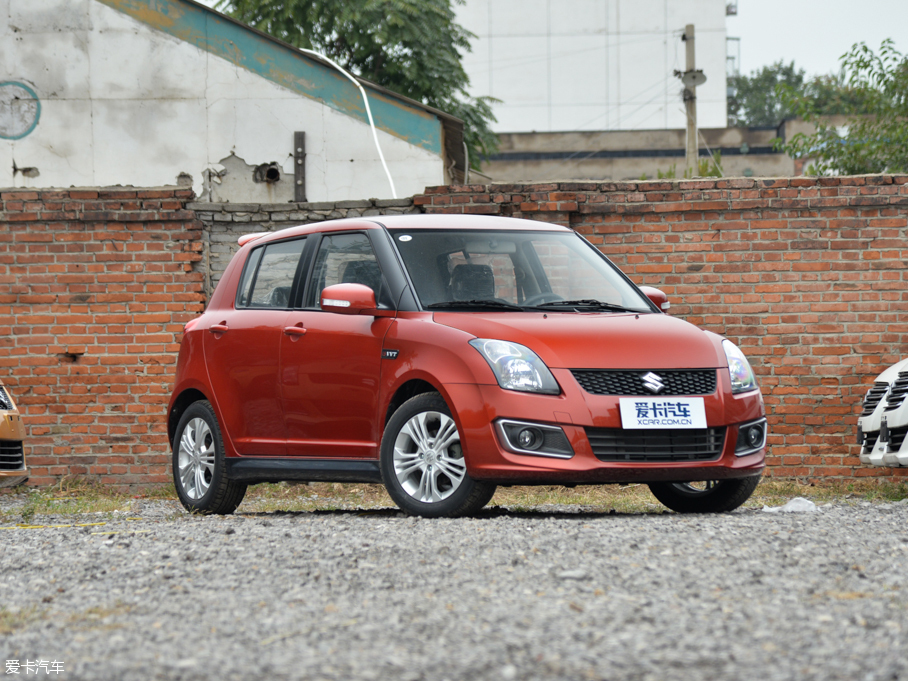
For the dilemma of the Chinese market, in 2015, Suzuki shifted its strategic focus in China to Chang ‘an, and then the "1855 Strategy" was officially put on the agenda, that is, from 2014 to 2018, five new cars will be launched within five years. If we scrutinize the practical significance of Suzuki’s strategy in China, it is that Suzuki’s future products will no longer be limited to mini-cars and small cars, but also play with compact cars with higher market share and small SUVs that are more popular nowadays.
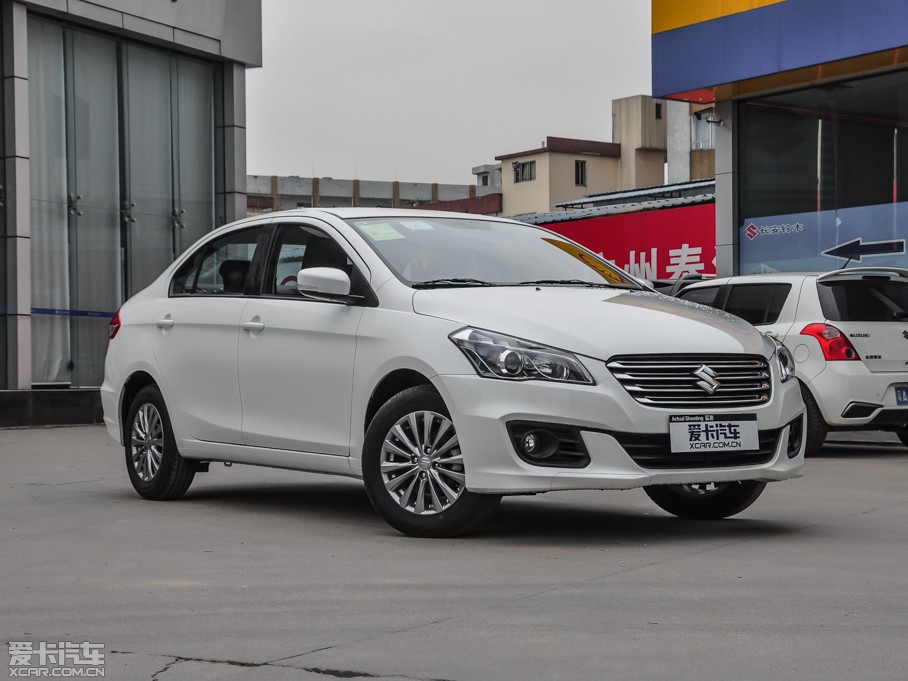
In 2014, Changan Suzuki launched a new compact car, Kaiyue. As a compact car for home users, Changan Suzuki can make up for its lack of brand influence with price. The moderate appearance, spacious interior space, sufficient power and affordable price have well grasped the psychological demands of ordinary consumers in China.
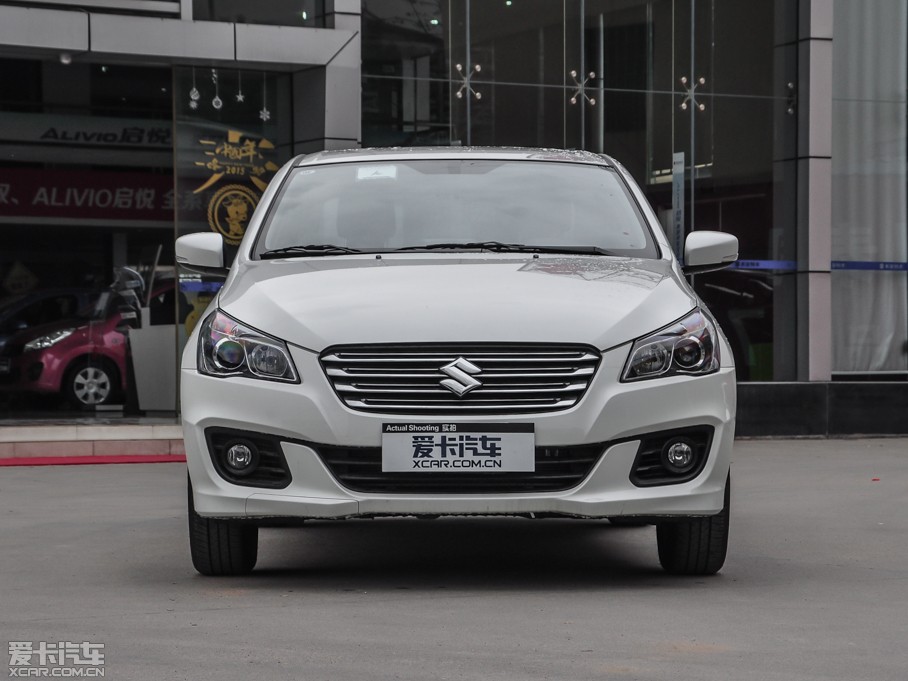
Qiyue entered the market at a low price to make up for its lack of brand influence, and promoted product sales with prices and benefits. However, since its listing in 2014, the sales situation of Kaiyue in China is not optimistic, and even it is gradually marginalized in the compact market. In the past, it was regarded as the "pillar" of Changan Suzuki, and it did not play a key role. Moreover, if the compact market is lost, it will be a big loss for Changan Suzuki.
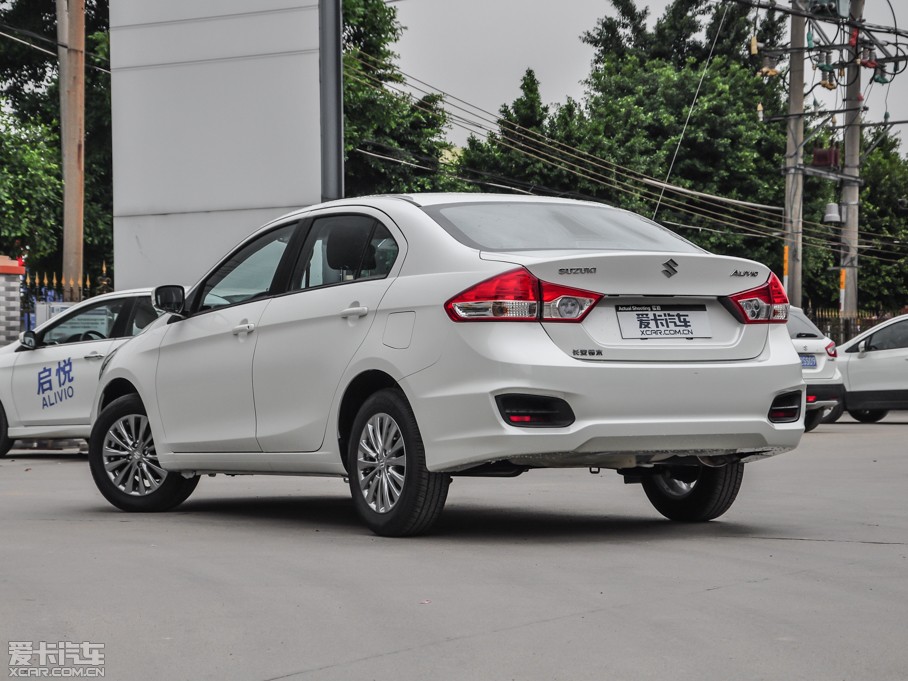
The advent of Qiyue is only the tip of the iceberg of Suzuki’s strategy in China. In 2015, Changan Suzuki went public in Vitera. This was after the cross-border SUV Fengyu once achieved good market feedback, Changan Suzuki made product layout in the small SUV market with great demand.
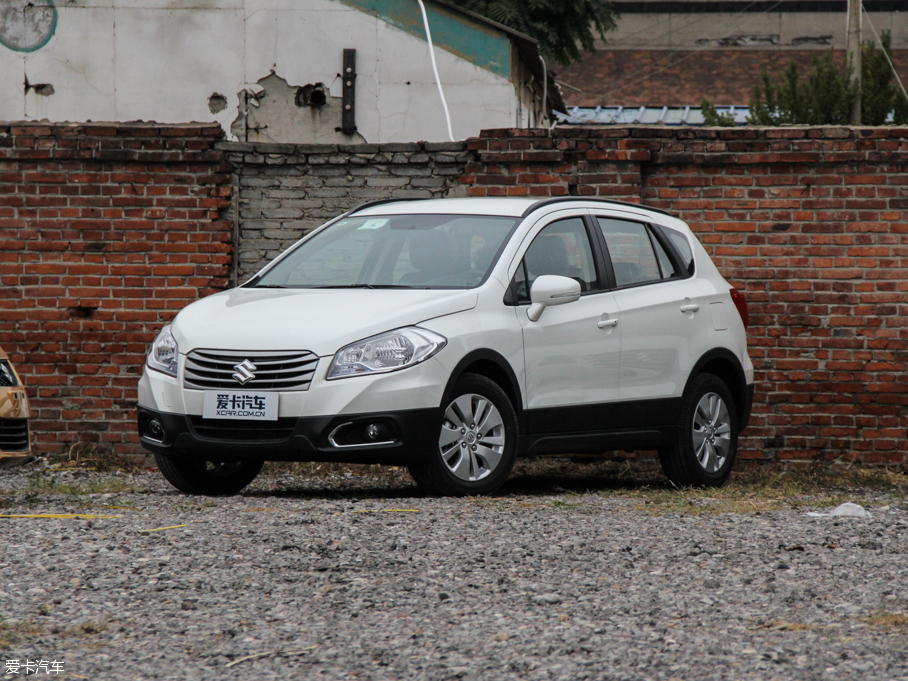
Changan Suzuki Vitera is a small SUV with great brand personality. The new car inherits Suzuki’s classic hard-core style, and adopts double banner air intake grille. The front line is rough and sharp, and the lower part of the middle net extends downward through trapezoidal lines, further strengthening the solid and tough characteristics of Vitera. A waistline full of strength on the side of the car extends from the front to the rear, while the two-color car body with dynamic rim modeling adds a bit of fashion to it. The rear line of the car is simple and bright, and the irregular hexagonal taillights also add a touch to the new car.
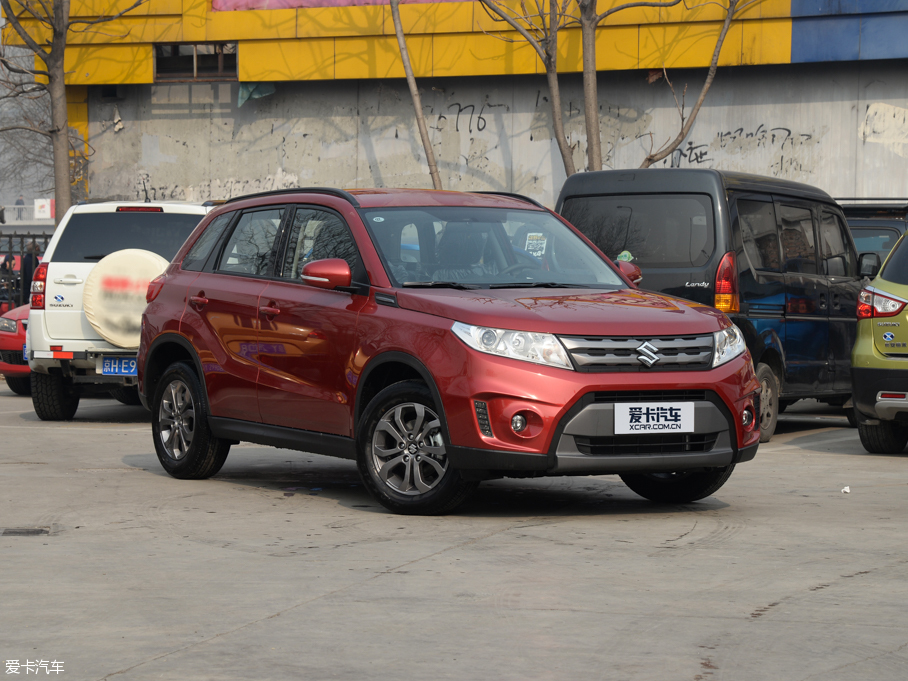
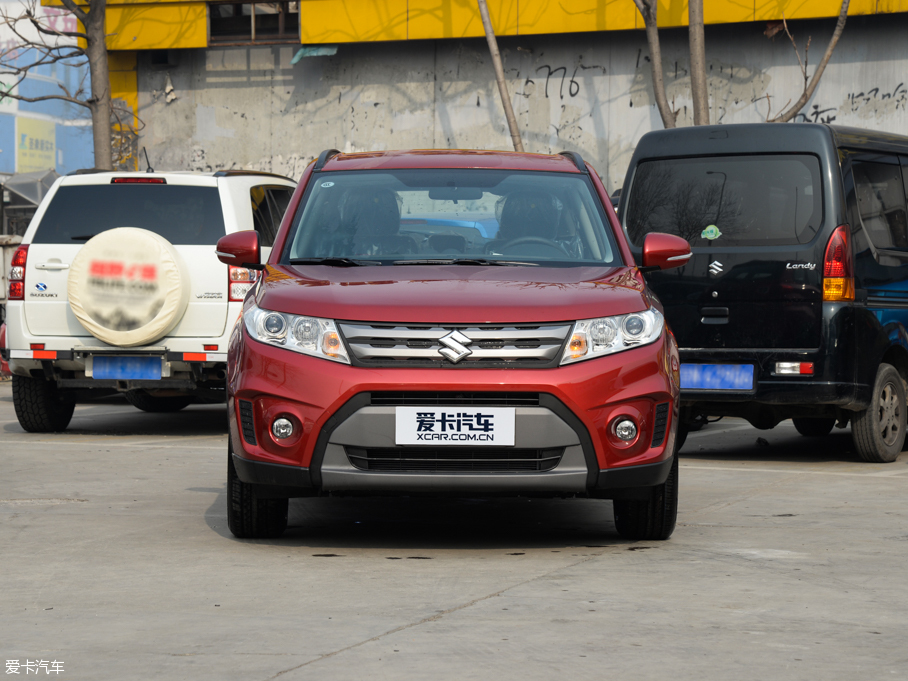

Changan Suzuki’s new Vitera has a length/width/height of 4175/1775/1610mm and a wheelbase of 2500mm respectively. According to different configurations, six models will be launched, and there are three power schemes: 1.6L+5MT, 1.4T+6MT and 1.4T+6AT.
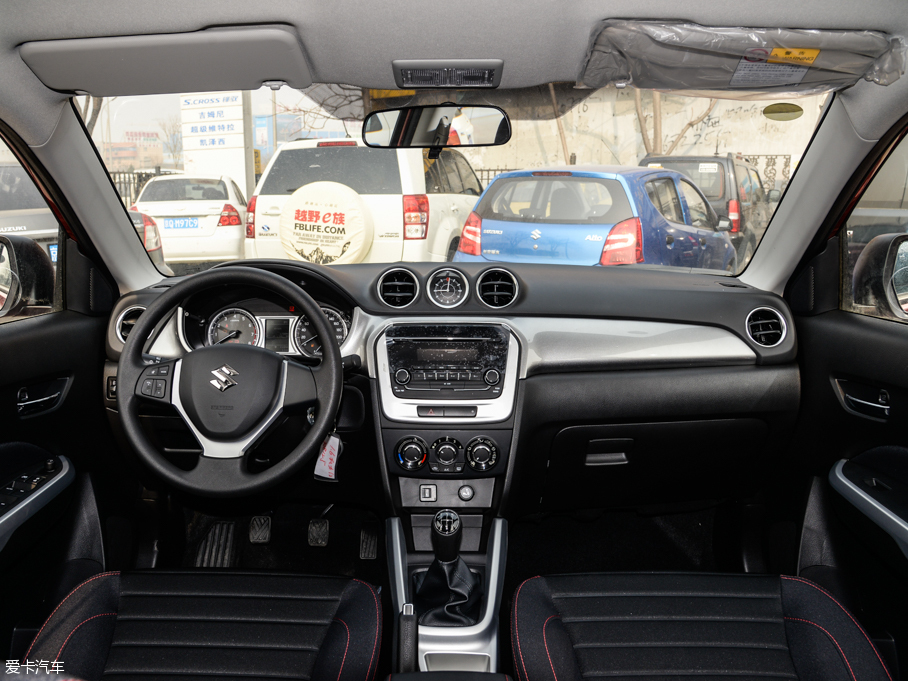

Since the first generation of Vitera went on the market in 1988, the style of urban off-road SUV has never been lost. Now the car has embarked on the road of localization, and its personalized design is mainly aimed at the main consumer groups after 1980s and 1990s, which shows that Suzuki attaches great importance to the small SUV market. For Suzuki, who is in hindsight, Vitera is also expected to become its most profitable product.
Summary:Long-term product shortcomings have led to Suzuki’s failure to establish brand competitiveness to compete with mainstream Japanese cars in China. With the implementation of the new product strategy, Suzuki will share different market segments. According to previous news, Suzuki will launch products in the B-class car market to supplement its product line in the future, but at present, Suzuki’s pillar product in China is still Vitera.
The 72-year-old woman was abused because she couldn’t do housework. The old man: It’s only natural to beat his wife.
Recently, the Japanese girlfriend of Jiang Jinfu, a well-known domestic actor, exposed many photos of bruises on various parts of her body on the Internet, and Jiang Jinfu also publicly issued a document, admitting that she had committed domestic violence and apologizing.
November 25th every year is the International Day for the Elimination of Domestic Violence established by the United Nations, also known as the International Day against Domestic Violence. Not many people know this day, but there are not many people who are silently suffering from domestic violence in their lives.
According to the "Special Report on Judicial Big Data of Divorce Disputes" recently released by the Supreme Court, applying to the court for dissolution of marriage on the grounds of "domestic violence" ranks the second reason for divorce, accounting for 14.86%, second only to "emotional disharmony". In fact, domestic violence nowadays is not only between husband and wife.
Do you know any domestic violence around you? What kind of behavior is domestic violence? Recently, a reporter from chongqing morning post interviewed this.
If a wife can’t do anything well, she should learn a lesson.
Zhang Xiuying, 72, was sitting in the courtyard dam, burying his face and his eyes were red. After removing her hand, a deep palm print was left on her cheek, which was played by her 76-year-old wife Zheng You. This is a domestic violence case released by the Rights Protection Department of the Municipal Women’s Federation.
Zheng You has always been more capable, but Zhang Xiuying is not very good at housework. Zheng You does all the work at home and abroad. Sometimes when he is tired, he will fly into a rage and beat his wife to trap to feel avenged.
"It’s natural to beat your wife." Zheng You said angrily, "The old woman can’t do anything well, that’s the lesson!"
The village "two committees" immediately set up a help team to intervene, and after visiting to find out the basic situation, they formulated a help plan. They found that the most important reason for domestic violence is that the husband and wife are uneducated and lack legal knowledge. Although Zheng You also realized that beating people was wrong, he had no idea that domestic violence was an illegal and criminal act, and he had never heard of the Anti-Domestic Violence Law. Zhang Xiuying silently endured domestic violence and didn’t realize that her rights and interests had been violated.
Therefore, every time the help team visits the home, they will repeatedly explain the laws and regulations such as the Anti-Domestic Violence Law. At the same time, the deep-seated reasons of family violence are analyzed: the couple are old and sick, and their lives are stretched; Zheng You was busy growing vegetables and living, and he didn’t have a hot meal when he got home. When he was in a hurry, he couldn’t help being rude. To this end, the help team took the initiative to help Zheng You arrange sanitation work in the village, which solved the practical difficulties of his family. Through many visits and contacts, the support team found that the couple actually had a good emotional foundation, and there were no principled differences or major contradictions. Zhang Xiuying is not good at housework mainly because she is old, sickly, slow, honest and not capable, and she feels guilty for not being able to share it with her husband.
As a result, the help team found the couple’s children again, asking them to visit their parents more, to rebuild the family warmth, so that they can understand each other’s difficulties and cherish the old company more. Slowly, Zheng You realized the harm of domestic violence, slowly learned to be considerate of his wife, and after helping and intervening, there was no domestic violence again.
"Xiong Haizi" is disobedient, and dad is fist educated.
In April, a 12-year-old boy came from Yuzhong District Women’s Federation. He first wandered in the corridor and then looked into the office. Chen Qian, vice chairman of the Women’s Federation, noticed him. After asking, he learned that this junior high school boy named Ding Ding came for help because of domestic violence. His father’s education method is simple and rude, and what goes wrong is a beating — — Eat slowly, hit; Stuttering, hitting; The academic performance has dropped. Fight!
Fist has become the main way of communication between father and son.
Chen Qian put down his work and had a few serious talks with Tintin first. She told Ding Ding, you see how hard it is for Dad to work outside every day to get money to take care of his family. "You are a man. It’s wrong for Dad to hit you, but you should also think about what you did badly."
Chen Qian made several phone calls with Tintin’s father to find out the situation. The father has repeatedly said that Tintin is a "Xiong Haizi" and always makes himself angry if he doesn’t listen. Because my education level is not high, and I am not very reasonable, I can’t control my fist when I see my child disobeying.
Chen Qian told him that you see that children know how to find 110 and ask the Women’s Federation for help, which is very generous and can tell the whole story clearly. It is generally difficult for children of the same age to do it. This is Ding Ding’s strength! Chen Qian tried to let his father see the bright spot of the child, and also told him the seriousness of hitting the child. If the circumstances are serious, it will constitute a crime. Chen Qian later followed this ordinary domestic violence incident many times and found that the relationship between father and son had obviously eased and improved.
It is common for parents to beat their children. As everyone knows, it may have violated the law.
So, how to define whether "beating children" constitutes domestic violence? Lawyer Wang Tianqiang of Beijing Dacheng (Chongqing) Law Firm said that minors were beaten by their parents for the purpose of education and did not cause harm to minors’ body and mind, which belongs to normal family education. Parents’ abusive behavior, which is not aimed at education, directly affects minors’ bodies, causing them physical or mental pain and damaging their physical health and personal dignity, is a violation of the Anti-Domestic Violence Law (which came into effect on March 1, 2016) and the Criminal Law. The relevant provisions on domestic violence in the Opinions on Handling Domestic Violence Crimes in accordance with the law of the two houses of congress should be in accordance with the law. Its boundary is whether the infringement has caused harm to its body and whether its harm has violated the law.
Expert interpretation
▲
Domestic violence between husband and wife is mostly in these situations.
The Municipal Women’s Federation has analyzed the cases of domestic violence letters and visits, and thinks that domestic violence between husband and wife is mostly:
One is to treat the woman as a punching bag. Most women who suffer from domestic violence have no fixed job and income, low education level and financial independence. Their dependence on the man reduces their status in the family, and they become the "accessories" and "punching bags" of the man in life, and they are beaten and scolded by the man for no reason.
Second, men have bad habits. Some men are grumpy, selfish, and lack of love and responsibility. When some requirements are not met or their families interfere with their bad habits such as drinking, gambling and drug abuse, when their wives persuade them or when their husbands and wives quarrel, the man overpowers the woman with violence.
The third is the escalation of physical conflict. When some couples had physical conflicts in the early days, the woman forbeared again and again for reasons such as "speaking out to lose face", "forbearing too much" and "the man was drunk and in a bad mood", which led to the man becoming accustomed to it and escalating into domestic violence.
The fourth is the type of intentional trouble. The relationship between the two sides is not harmonious or the man has an extramarital affair. The man is unwilling to file for divorce for some reasons, but forces the woman to file for divorce on her own initiative through domestic violence. Most women who suffer from domestic violence, especially those whose children are young or have no fixed jobs, are reluctant to divorce, mostly because they are worried that divorce will bring adverse effects to their children or that they will be homeless after divorce.
remind
▲
Remember to leave evidence in case of domestic violence.
Yuzhong District Court has conducted statistics, and in recent years, about 10% of the marriage and family disputes concluded involved domestic violence. Because domestic violence occurs among family members, the location is relatively private, and the parties have poor awareness of preserving and fixing evidence, which leads to cases of domestic violence that are difficult to prove and judicial identification.
In 2016, in 53 cases of family disputes involving domestic violence in Yuzhong District Court, the parties only raised domestic violence in the form of oral statements, and 41 cases were unable to provide any evidence, accounting for 77.3%. In this case, violence cannot be identified. 12 pieces of evidence materials such as photos, police records, witness testimony or medical records can be provided, accounting for 22.6%. Among the cases that provided evidence of domestic violence, 6 cases could not be identified as violence due to only photos or medical records and the relevance of witness identity, and only 6 cases were finally identified as domestic violence.
Remember the rights hotline 12338.
The Rights Protection Department of the Municipal Women’s Federation stressed that domestic violence is an illegal act, not a housework, so we must say "no" to domestic violence!
The Municipal Women’s Federation suggested that there are several ways to deal with domestic violence: victims of domestic violence, their legal representatives and close relatives can complain, reflect or ask for help to the units where the perpetrators or victims work, residents’ committees, villagers’ committees, women’s federations and other units.
Victims of domestic violence, their legal representatives and close relatives may also report to the public security organ or bring a lawsuit to the people’s court according to law. You can request the public security organ to give criticism and education to the injurer or issue a warning.
Apply to the people’s court for a personal safety protection order because of domestic violence or the real danger of domestic violence.
For homeless victims of domestic violence, they can apply for asylum at the domestic violence shelter, which will provide temporary life assistance to victims of domestic violence.
Victims of domestic violence can also request trade unions, Communist Youth League, women’s federations, disabled federations, residents’ committees, villagers’ committees, etc. to provide legal education to perpetrators of domestic violence, and psychological counseling if necessary.
In addition, the Municipal Women’s Federation opened the 12338 hotline for women’s rights protection in 2005, covering the whole city in 2010. In 2015, the hotline was upgraded, and its functions were expanded to the hotline for rights protection consultation, psychological consultation and girl whisper. From November 2015 to September 2018, the Municipal Women’s Federation received more than 2,000 calls for help.
(The parties involved in domestic violence are pseudonyms)
laws and regulations
▲
People’s Republic of China (PRC) Domestic Violence Act
Article 16: If the circumstances of domestic violence are minor, and public security administration punishment is not given according to law, the public security organ shall give criticism and education to the offender or issue a warning.
The warning should include the identity information of the perpetrator, the factual statement of domestic violence, and the prohibition of domestic violence by the perpetrator.
Marriage Law of the People’s Republic of China
Article 43: If domestic violence or ill-treatment of family members is committed, the victim has the right to make a request, and the residents’ committee, villagers’ committee and the unit to which he belongs shall dissuade and mediate.
The victim has the right to make a request for the ongoing domestic violence, and the residents’ committee and villagers’ committee shall dissuade him; The public security organ should stop it.
If the victim makes a request for domestic violence or maltreatment of family members, the public security organ shall impose administrative punishment in accordance with the law on administrative penalties for public security.
People’s Republic of China (PRC) Public Security Administration Punishment Law
Article 43: Whoever beats another person, or intentionally hurts another person’s body, shall be detained for not less than five days but not more than ten days, and shall be fined not less than 200 yuan but not more than 500 yuan; If the circumstances are minor, they shall be detained for not more than five days or fined not more than five hundred yuan.
Article 45: Anyone who commits one of the following acts shall be detained for not more than five days or given a warning: (1) maltreating a family member, and the abused person requests to deal with it; (2) Abandoning a dependant who is unable to live independently.
Criminal Code of People’s Republic of China (PRC)
Article 234 Whoever intentionally harms another person’s body shall be sentenced to fixed-term imprisonment of not more than three years, criminal detention or public surveillance.
Whoever commits the crime mentioned in the preceding paragraph and causes serious injuries shall be sentenced to fixed-term imprisonment of not less than three years but not more than ten years; Whoever causes death or causes serious disability by particularly cruel means shall be sentenced to fixed-term imprisonment of not less than 10 years, life imprisonment or death. Where there are other provisions in this Law, such provisions shall prevail.
Law of People’s Republic of China (PRC) on the Protection of Women’s Rights and Interests
Article 46: Domestic violence against women is prohibited.
The state takes measures to prevent and stop domestic violence. Public security, civil affairs, judicial administration and other departments, as well as urban and rural grassroots mass autonomous organizations and social organizations, shall prevent and stop domestic violence within their respective functions and duties, and provide assistance to women victims according to law.
▲
What is domestic violence?
Domestic violence refers to physical and mental violations committed by family members by beating, binding, maiming, restricting personal freedom, and frequent abuse and intimidation. The traditional definition of domestic violence refers to the behavior between family members, but with the development of the times, the definition of "family members" seems too narrow, and there are more and more phenomena of cohabitation before marriage and divorce without leaving home in society, and the anti-domestic violence law also has relevant provisions on this. Therefore, violence between non-marital partners can also be implemented with reference to the provisions of the anti-domestic violence law.
Domestic violence is hidden, and many families are "quarreling — Violence — Reconciliation "in the cycle, because in the face of family members with deep feelings, many victims are reluctant to tell outsiders, let alone resort to the law. It is only the tip of the iceberg that domestic violence cases have been discovered and entered the proceedings. Even in the investigated domestic violence cases, most of the victims have actually suffered from long-term violence before the incident, and they have to endure the limit before they speak out.
Yuzhong District Court analyzed the concluded cases involving domestic violence, and found that the forms of violence were diversified, mainly physical violence such as beating, injury and restriction of personal freedom, and showed diversified and compound characteristics.
Most of the victims of domestic violence are women. For the purpose of saving marriage, domestic violence is regarded as a domestic affair. During the marriage relationship, victims often take a tolerant attitude towards domestic violence or respond by "fighting violence with violence". Only when filing a divorce lawsuit, the victim takes domestic violence as the reason for filing for divorce.
Supreme Leader: Building a New Type of International Relations with Win-win Cooperation as the Core
"The trip to the avenue is also the world’s public." Our cause is a win-win cooperation with all countries in the world. Faced with the profound changes in the international situation and the objective requirements of all countries in the same boat, the CPC Central Committee with the Supreme Leader as the general secretary creatively put forward the grand idea of building a "new type of international relations", which enriched and developed China’s diplomatic thinking and profoundly influenced the development of international relations. Since the 18th National Congress of the Communist Party of China, "new international relations" has appeared more than 50 times in the public speeches and articles of the Supreme Leader General Secretary. At the joint opening ceremony of the eighth round of China-US Strategic and Economic Dialogue and the seventh round of China-US high-level consultations on people-to-people exchanges, the Supreme Leader once again stressed: "China firmly adheres to the path of peaceful development, advocates all countries to take the path of peaceful development together, and promotes the construction of a new type of international relations with win-win cooperation as the core, so as to build a community of human destiny. We are willing to strengthen cooperation with all countries in the world, jointly safeguard the international order and international system with the purposes and principles of the UN Charter as the core, promote the development of the international order in a more just and rational direction, and make the planet we live in a better place. " Please learn with "Learn China".
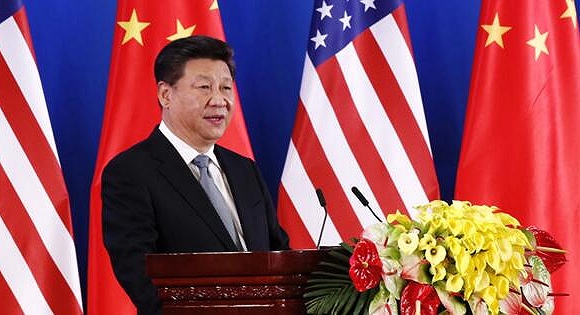
Pictured: On June 6, 2016, president’s top leaders attended the joint opening ceremony of the 8th China-US Strategic and Economic Dialogue and the 7th China-US High-level Consultation on People-to-People Exchanges held at Diaoyutai State Guesthouse in Beijing, and delivered an important speech entitled "Make unremitting efforts to build a new-type relationship between China and the United States".
First, China’s plan that conforms to the trend of the times
"Although wise, it is better to take advantage of the situation." The trend of the times is rolling forward, and those who follow it will die. Facing the complicated international situation, how can we handle the relations between countries and maintain the stable development of the international community? This is a question that all countries are thinking about. In March 2013, the Supreme Leader made a speech at Moscow Institute of International Relations in Russia: "Faced with the profound changes in the international situation and the objective requirements of all countries in the world to help each other in the same boat, all countries should jointly promote the establishment of a new type of international relations with win-win cooperation as the core, and the people of all countries should work together to safeguard world peace and promote common development." This is the first time that the Supreme Leader has visited president since he was elected, and it is also the first time that the concept of "new international relations" was put forward. Since then, "new international relations" have appeared in various international occasions, and they are used to express China’s position and show the "China Plan" when dealing with international relations.
Looking back on the historical process since the nation-state came into being, human beings have been tirelessly exploring ways to get along with each other. The Peace Treaty of Westphalia was signed in 1648, and the Westphalia system was born in Europe. It established the important principles of sovereignty and equality, and initiated the precedent of modern international relations. But this system ultimately failed to prevent Europe from falling into a group battle. In 1815, the Final Protocol of Vienna Conference was signed, and the Vienna system came into being. According to the principle of balance of power, the geopolitical map of Europe after the Napoleonic Wars was rearranged, and the peace in Europe was maintained for a long time. But it eventually led to alliance confrontation and arms race until the outbreak of the First World War. In 1945, 50 countries joined hands to create an international order and corresponding international system with the United Nations as the core and based on the purposes and principles of the Charter of the United Nations, which opened a new historical chapter for international relations and international system construction. For more than 70 years, the efforts and role of the United Nations in maintaining world peace and security, promoting world economic development and promoting world human rights progress are obvious to all. The history of hundreds of years shows that the formation of every international relationship and the establishment of every international system bear a distinct imprint of the times, and must be constantly innovated and improved with the development of the times, otherwise it will not keep up with the times, or even lose its advanced nature and rationality.
With the advent of the era of globalization, great changes have taken place in the international power balance, and the existing international order and system are increasingly facing new challenges. For example, the purposes and principles of the Charter of the United Nations are often not truly observed, and all kinds of injustices occur from time to time in international relations. Especially in recent years, economic downturn, geo-turbulence, terrorist attacks, civilization friction and other chaos have come and gone, and some western scholars even exclaimed that we are entering a "disorderly world". Under the new historical conditions, what kind of international relations can better implement the purposes and principles of the UN Charter and better safeguard and develop the international system with the UN at its core? In recent years, some people put forward the "hegemonic stability theory" and advocated building an omnipotent superpower to lead international affairs; Some people put forward the "global governance theory", advocating that countries weaken their sovereignty and formulate common rules to manage the world; Some people put forward the "universal theory of value", advocating the promotion of a certain self-considered "advanced" values and social systems to unify the world; All this is hard to convince and accept.
In today’s world, peace, development, cooperation and win-win are the trend of the times. The interdependence between countries is unprecedentedly close, and the symbiosis of interests is deepening. All countries are interconnected in the global supply chain, industrial chain and value chain. Any link that goes wrong will be affected. At the same time, the challenges facing world peace and development are more and more global, comprehensive and long-term. No country can be immune to it, and no country can conquer the world. All countries need to help each other in the same boat and work together. The supreme leader pointed out: "To keep up with the pace of the times, we can’t keep our bodies in the 21st century, but our heads are still stuck in the past, in the old era of colonial expansion, and in the old frame of cold war mentality and zero-sum game." Facing the multi-polarization of the world, the in-depth development of economic globalization, cultural diversity and the continuous advancement of social informatization, today’s mankind is more qualified than ever to move towards the goal of peace and development, and win-win cooperation is the realistic way to achieve this goal. For the international relations of the present era, the Chinese plan given by the Supreme Leader is: "Building a new type of international relations with win-win cooperation as the core". This is an important idea put forward by the Chairman of the Supreme Leader, who is in charge of the general trend of the world. It not only inherits and carries forward the purposes and principles of the UN Charter, but also transcends and innovates the traditional theory of international relations, which will certainly have a great and far-reaching impact on the future development of international relations. In September 2015,When attending the general debate of the seventieth United Nations General Assembly at the United Nations Headquarters in new york, the Chairman of the Supreme Leader pointed out: "In today’s world, countries are interdependent and share weal and woe. We must inherit and carry forward the purposes and principles of the UN Charter, build a new type of international relations with win-win cooperation as the core, and build a community of human destiny. "
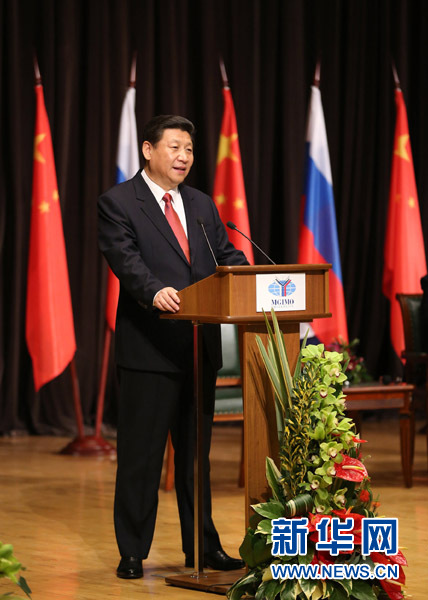
Second, the connotation of new international relations
A single flower does not make a spring. The core of "new international relations" is "win-win cooperation". Win-win cooperation means that two or more parties benefit from each other and complement each other in cooperation, so that all parties in cooperation can gain something or get what they want. Win-win cooperation takes cooperation as the path and win-win as the goal, which is the road map to new international relations. Cooperation and win-win complement each other and are integrated. China’s Foreign Minister Wang Yi said, "What is new about the new international relations? If you want to sum it up in one sentence, it is: replace confrontation with cooperation, replace monopoly with win-win, and stop engaging in zero-sum games and winners take all. "
Replace confrontation with cooperation. Cooperation is the way to build a new type of international relations. In today’s world, countries are interdependent and share weal and woe. Humans live in the same global village, in the same time and space where history and reality meet, and more and more become a community of destiny with you and me. The joint effect of the community of human destiny is becoming more and more obvious. Only cooperation can safeguard world peace and only cooperation can promote common development. The interaction and interest integration between China and the world are getting closer and closer. China’s dependence on the world and its participation in international affairs are deepening, and the world’s dependence on China and its influence on China are also deepening. In the course of more than 30 years’ reform and opening-up, China insists on dealing with the world in the way of cooperation rather than confrontation, and takes the road of win-win cooperation. Although there are still some imperfections in the international system established under the leadership of the existing western countries, China did not seek to "start a new stove", but participated in and joined various international mechanisms or organizations through its own efforts, and actively and voluntarily "embedded" itself into the network of the international system. China has demonstrated its willingness and determination to respect the international order and actively participate in international affairs through practical actions, and the international system has become more representative and legitimate because of the integration of China. In traditional international relations, the zero-sum game of alliance confrontation and arms race is not uncommon, but in today’s world, the zero-sum game and the cold war mentality are not in line with the trend of the times and are spurned by more and more countries. In April 2015,Speaking at the Pakistani Parliament, the Supreme Leader pointed out: "Chinese realized ‘ more than two thousand years ago; Although the country is big, belligerence is bound to die ’ The truth. People in China admire ‘ Don’t do to others what you don’t want them to do to you ’ , China does not agree with ‘ Theory that a strong country must dominate ’ 。” He stressed: "China will adhere to the concept of win-win cooperation, unswervingly develop friendly cooperation with other countries in the world, adhere to the concept of sincerity and tolerance, deepen mutually beneficial cooperation with neighboring countries, and strive to make its own development better benefit neighboring countries and always be a reliable friend and sincere partner of developing countries."
Replace monopoly with win-win situation. Win-win is the goal of building a new type of international relations. When attending the general debate of the 70th United Nations General Assembly, the Supreme Leader pointed out: "Development together is true development, and sustainable development is good development. To achieve this goal, we should uphold the spirit of openness and promote mutual help and mutual benefit. " Under the background that the international community is increasingly becoming a community of destiny in which you have me and I have you, the value and significance of win-win are increasingly being highlighted. We must adhere to the correct concept of justice and benefit, stress faithfulness, attach importance to affection, promote justice, and build morality, so as to truly give consideration to justice and benefit, and promote justice and benefit. At the same time, we must oppose hegemonism and power politics, take into account the legitimate concerns of other countries when pursuing our own interests, and promote the common development of all countries in the pursuit of our own development. The Supreme Leader pointed out: "All countries should establish a sense of community of destiny and truly recognize ‘ All glory, all loss ’ Co-operation in competition and win-win in cooperation. Take into account the interests of other countries when pursuing their own interests, and take into account the development of other countries when seeking their own development. "
Small four-cylinder beast is coming! Kawasaki ZX-4R, starting at 6.98w!
In the current motorcycle market in China, Kawasaki is more synonymous with Yan value school and strength school, and its Kawasaki NINJA400 is a online celebrity car in the 50,000 class. However, at the 2023 Beijing Motor Show, Kawasaki once again exploded the enthusiasm of the majority of motorcycle friends, and brought a Kawasaki NINJAZX-4R/RR with a four-cylinder engine to the domestic market, and the official selling prices of 69,800 yuan (ZX-4R) and 76,800 yuan (ZX-4RR) were more sincere than the previous 90,000 yuan.

In terms of appearance, Kawasaki ZX-4RR/R not only continues the design concept of Ninja series, but also incorporates the fighting atmosphere of ZX car series. However, as a medium-and small-displacement Kawasaki ZX model, the overall appearance is not as fierce as that of big brothers ZX-6R and ZX-10R, which is a matter of course. For more real cars, please see the live video.

In addition, Xiao Bian secretly told Lao Tie that this shell kit of Kawasaki ZX-4RR/R is universal with Kawasaki ZX-25R! Closer to home, let’s continue to look at the vehicle design, with a weight of 188KG, a height of 790mm, and a height of 170cm. You can easily land on your feet in the field test drive. If riders feel that sitting posture is not enough for fighting, overseas Kawasaki official website still has accessories for competitive seat cushions for sale. Will it be introduced simultaneously in China?

In terms of power, Kawasaki NIAJAZX-4RR adopts a high-speed inline four-cylinder naturally aspirated engine of 401cc, which can output a maximum power of 77 HP (57 kW) at 14,000 rpm, while it can reach a maximum power of 80 HP (58.7 kW) at the state of air stamping, and it can explode 39.6 Nm at 13,200 rpm.
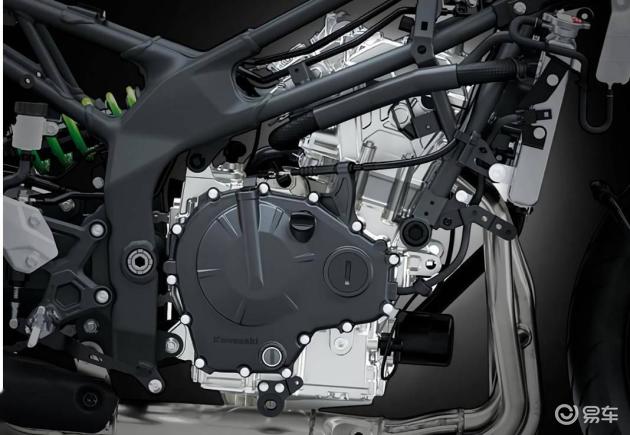
Next, in terms of suspension, Kawasaki NINJAZX-4R will adopt a combination of 37mm inverted front fork and horizontal multi-link structure with adjustable preload. For tires, the front 120mm 17 inches+the rear 160mm 17 inches are provided, and the matching brake system is the front 290mm opposite four-piston caliper+the rear 220mm single-piston disc brake.
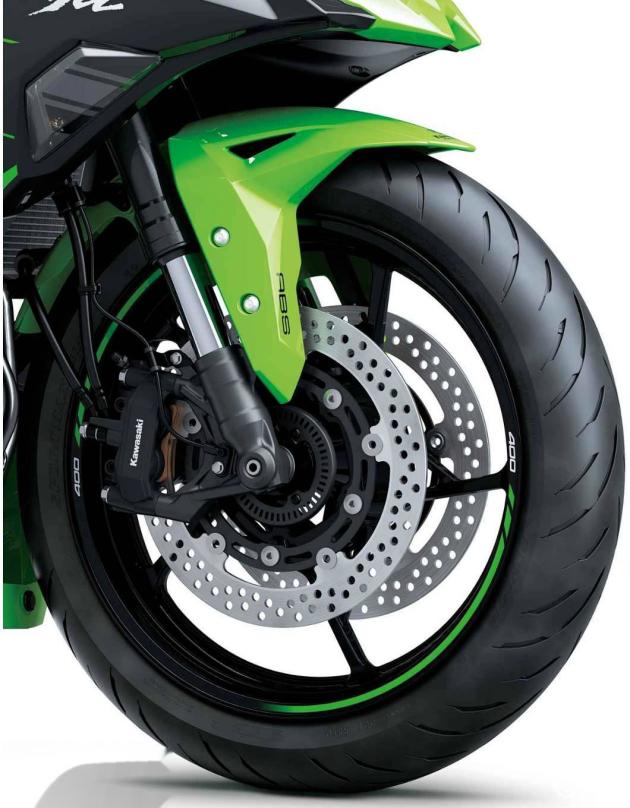
In addition, in terms of fuel tank, the fuel tank capacity of Kawasaki NINJAZX-4RR will reach 15 liters. For reference, the fuel tank capacity of KTMRC390 is 13.7 liters, that of 450RR is 14 liters, and that of Qianjiang Sai 600 is 18 liters.

SHOWASFF-BP inverted front fork is equipped, and the rear rocker arm adopts a simplified version of SHOWABFRC for shock absorption, which can be roughly understood as a fully adjustable version of ZX-25R.
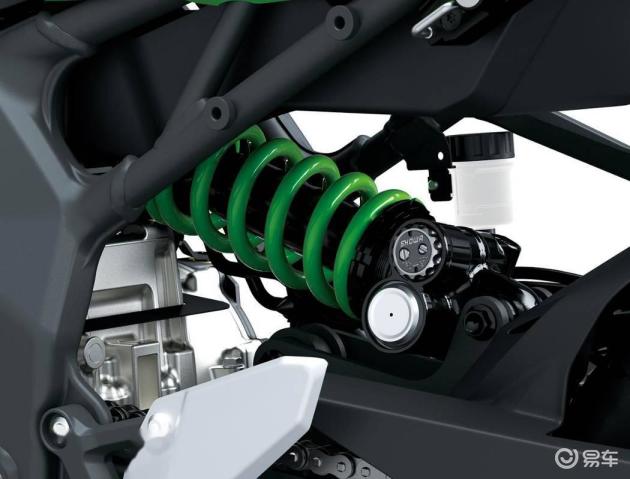
Large-sized 4.3-inch color TFT dashboard with excellent visibility. It also provides a riding mode combining KTRC(KawasakiTractionControl) and PowerMode, and riders can choose four modes: sports, highway, rainy day and user-defined settings. By the way, the dashboard also provides two display modes to choose from. They are road mode and track mode.

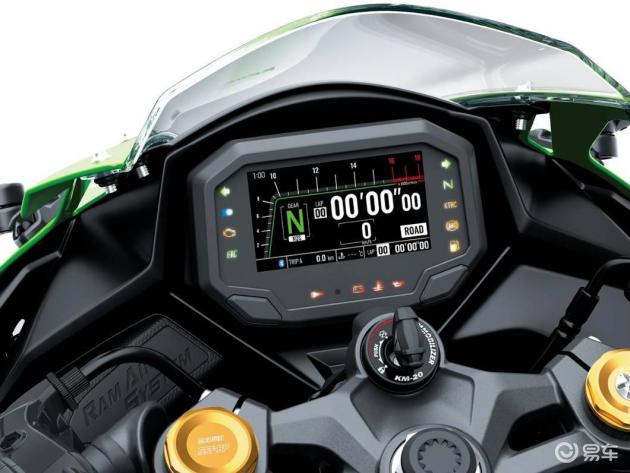
In addition, the car can also be connected to the smart phone through the special application "RIDEOLOGYTHEAPP", which is also a bright spot. You can record data logs such as driving routes connected with GPS, and confirm settings such as riding mode.

In a word, Kawasaki ZX-4R is a motorcycle worthy of attention and ownership. It not only has a beautiful appearance, strong power and advanced configuration, but also has a reasonable price. It is a medium and small displacement four-cylinder model that Kawasaki re-launched 35 years later, and it is also an important layout of Kawasaki for the China market. If you are a cyclist who likes four-cylinder imitation racing, then you must not miss this model. It will bring you unparalleled driving pleasure and experience.